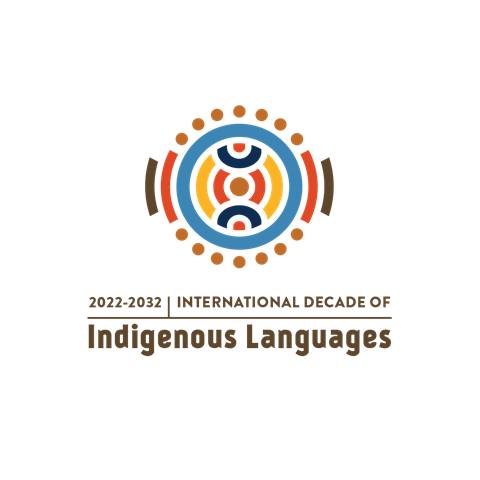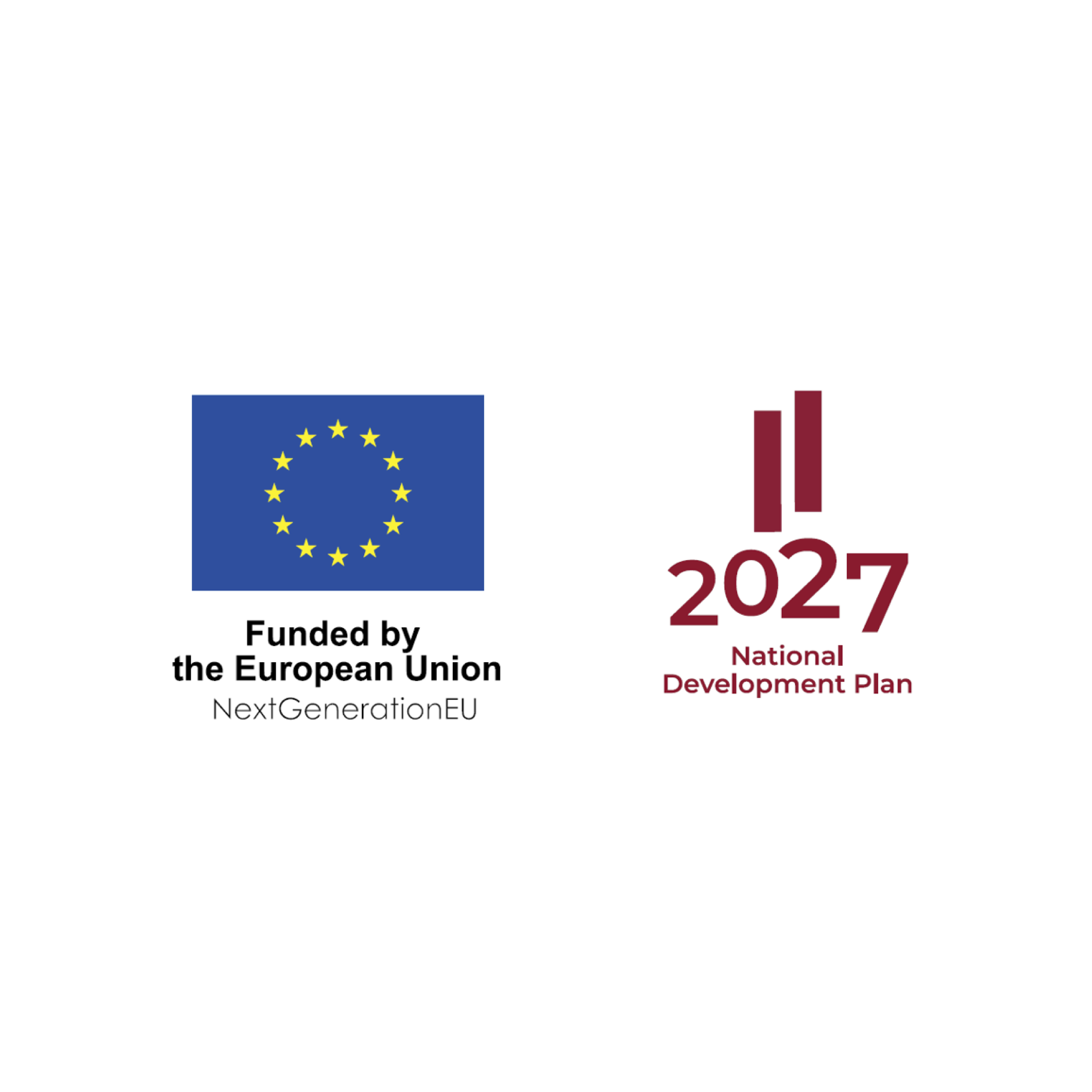December 31
Sieldõ, õldzizt ja joudzizt 2024!
May your 2024 be clear, bright and full of energy!
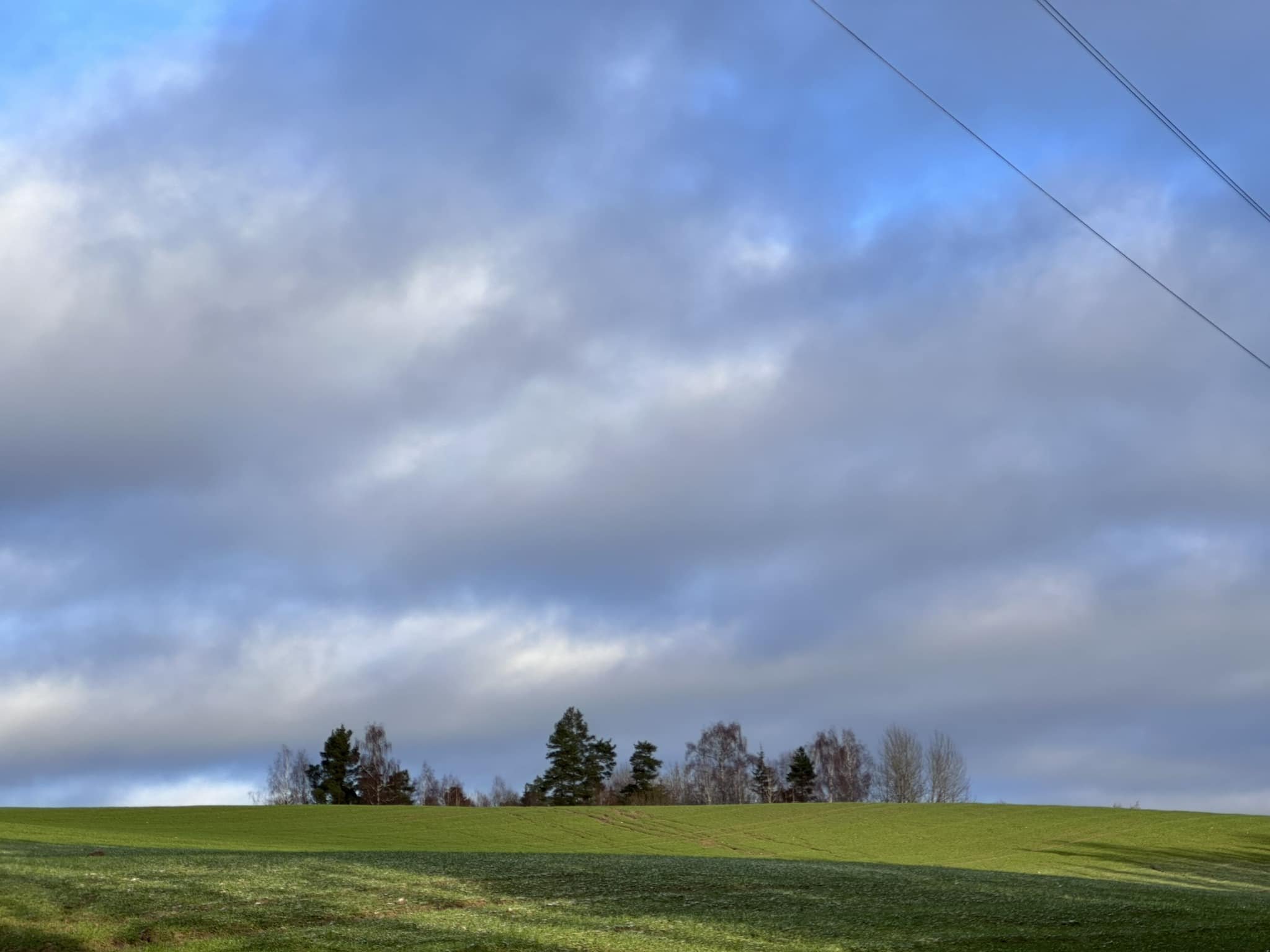
December 28
Today, thanks to the donations of “Lafivents” and our researchers, under the care of SensusLab audiovisual solutions, the first steps have been taken so that next year, with the support of the Ministry of Education and Science, the learning of the Livonian language and culture can begin both in person and remotely.
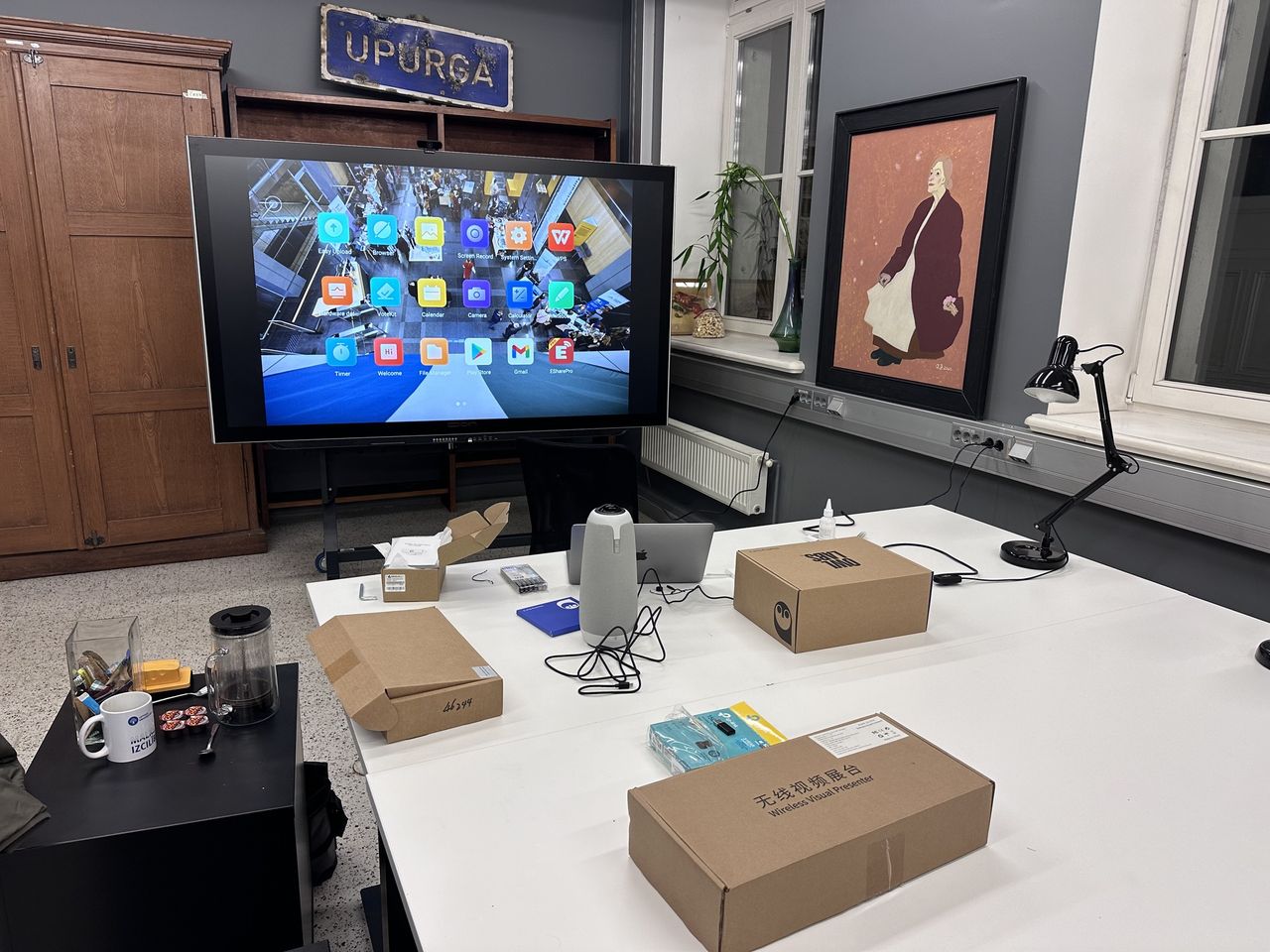
December 24
Rīemliži Taļžpivḑi ja joudzizt tulbizt āigastõ!
Merry Christmas and a Happy New Year!
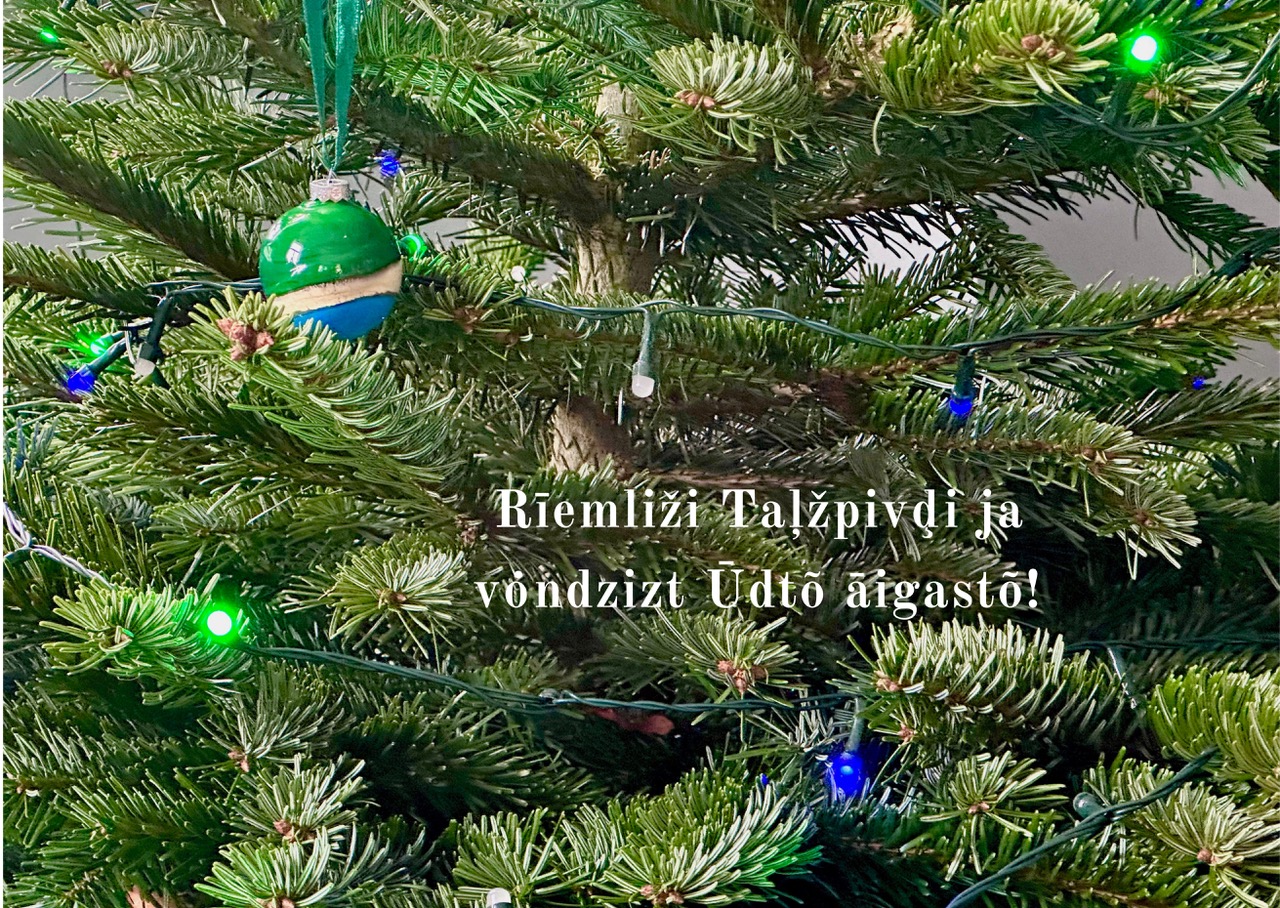
December 20
Milda Kurpniece, one of the researchers of the Livonian Institute, has defended her doctoral thesis “The Livonian jussive in the context of the Central Baltic area” at the University of Tartu (supervisors – prof. Birute Klaas-Lang and Dr. phil. Miina Norvik, opponent prof. Axel Holvoet), hereby obtaining her PhD. Pāgiņ vȯnnõ!
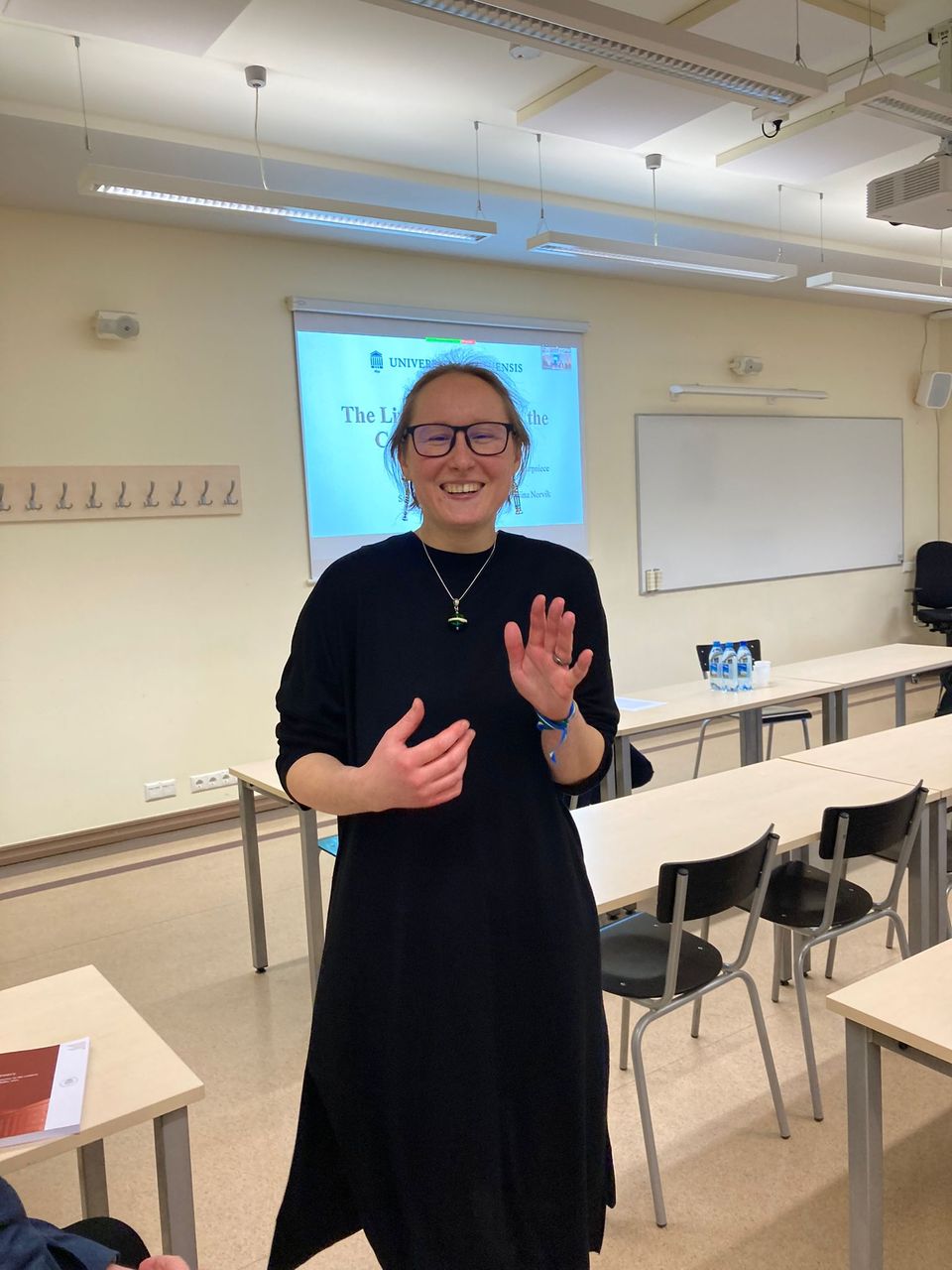
December 18
Several road signs in Livonian have been put up on the Livonian coast.
Picture by Aldis Pinkens.
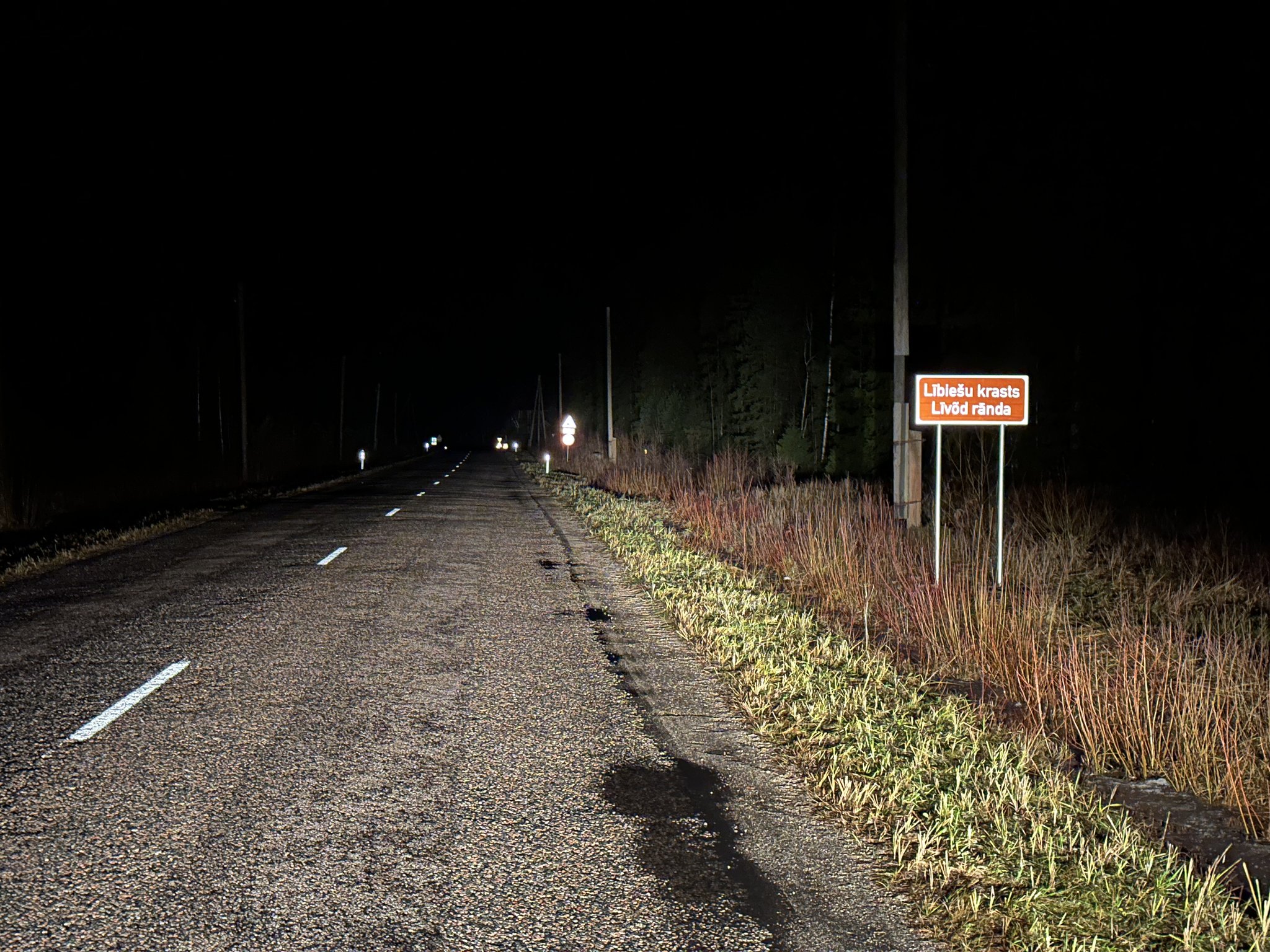
December 16
A Livonian Day with a rich program, participants and activities took place at the National Library of Latvia. This marked the closing of the Year of Livonian Heritage and the 5-year anniversary of the Livonian Institute of the University of Latvia.
On Livonian Day at the National Library of Latvia, visitors could meet many actors of the Year of Livonian Heritage: municipalities, entrepreneurs, researchers, ensembles, public organizations, etc. They could also get to know the Livonian language, culture and traditions in all their diversity – from songs, dances and handicrafts to books and traditional and modern Livonian dishes.
This Livonian Day was organized by the Livonian Institute of the University of Latvia, along with the National Library of Latvia.
Picture by K. Teilāns
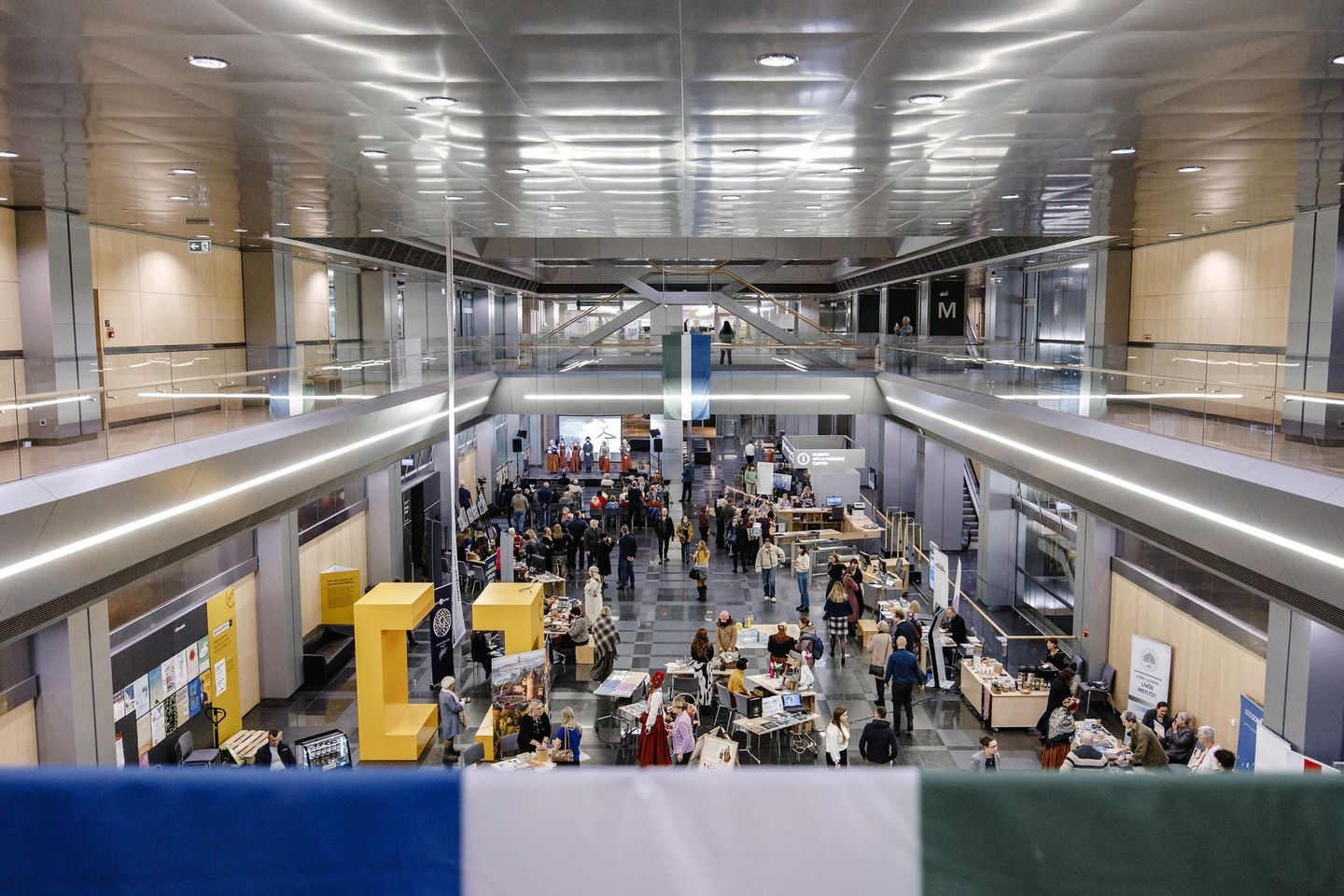
December 8
The director of the Livonian Institute, Valts Ernštreits, participated in and moderated the forum “Traditional culture development challenges in Riga” in Riga.
The forum discussed the place of traditional culture in today’s and tomorrow’s Riga.
December 7-10
The 29th LIPP Symposium “Small languages on the big stage: Linguistic diversity in research, revitalisation, and policies” took place at the University of Munich (Ludwig-Maximilians-Universität München).
Institute researchers Valts Ernštreits and Milda Kurpniece participated in the symposium with a presentation on the corpus of the Livonian language, and researcher Gunta Kļava made a presentation on the problems of language transfer.
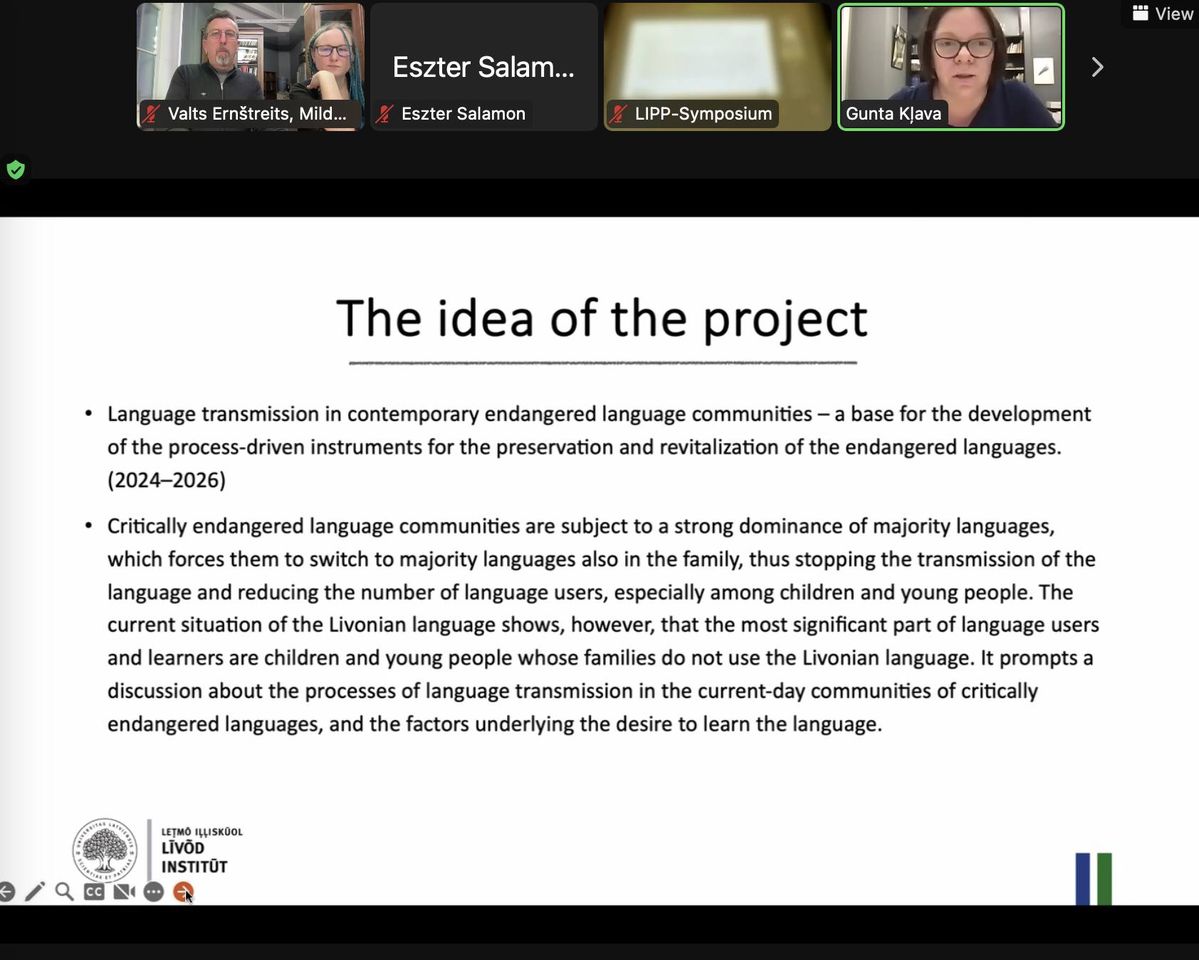
December 4
TV9 Pakalni gave an insight into the inclusion of the Livonian language in official signposts and the role of the Livonian language in promoting the development of the Northern coast of Kurzeme.
The director of the Livonian Institute, Valts Ernštreits, talks about the long process of the installation of road signs in the Livonian language and their importance for the preservation and popularization of the Livonian language and culture.
December 1
A team of 11th graders from Riga Jugla High School (Patrīcija Barvika, Rodrigo Ābelītis, Mikus Kulaks) participated in the 1st round of the Latvian Culture Canon competition organized by the Latvian Academy of Culture with their work on the Livonian culture in Latvia, testing their assumptions and research about the loss of this cultural value and possible rescue scenarios.
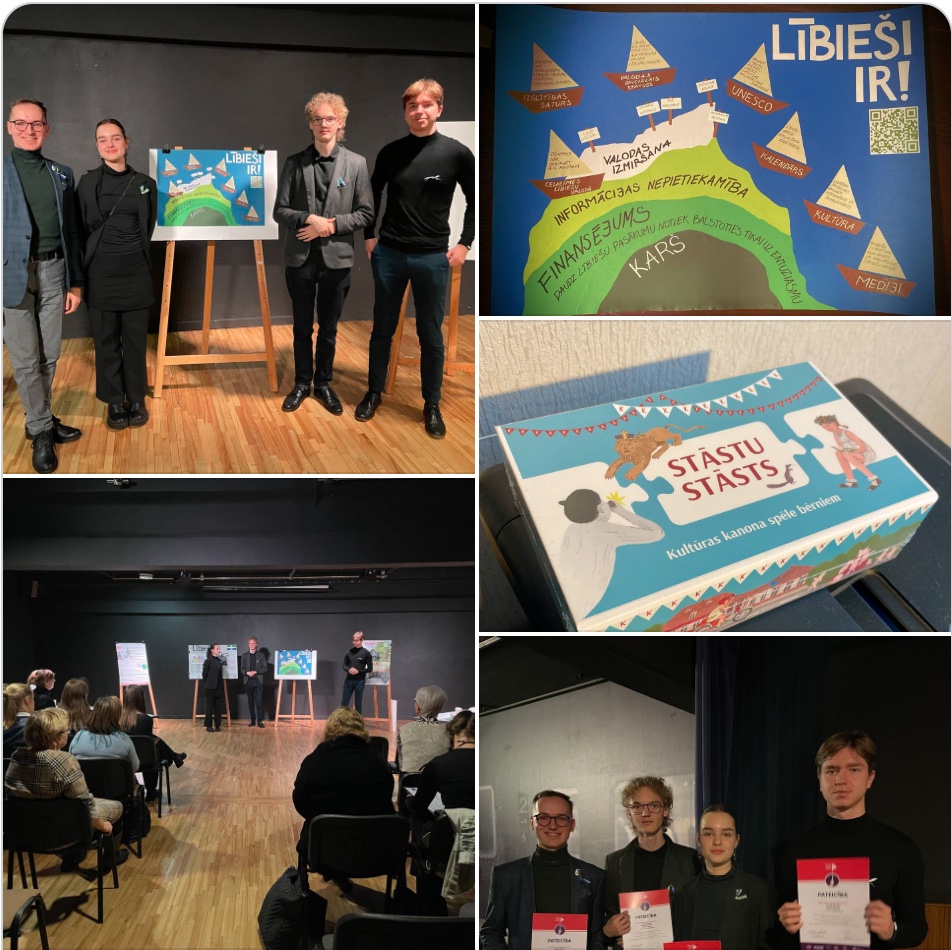
November 30
Latvian Radio 1 program “Grāmatai pa pēdām” (“In the Footsteps of Books”) about Livonian literature and the beginnings of the Livonian written word.
The Livonian heritage, as well as literature today, are talked about in the program by the head of the Livonian Institute of the University of Latvia, researcher of the Livonian language and poet Valts Ernštreits, along with literary scholar Māra Grudule.
November 29
In Aizkraukle, the seminar “Daugava Livonian Footsteps in Aizkraukle” is being held, which is dedicated to the heritage of the Livonian people in the district of Aizkraukle.
The seminar presented a project implemented on the initiative of the cultural administration of the Aizkraukle district in cooperation with the Livonian Institute of the University of Latvia and other Latvian researchers, the purpose of which was to identify and map the Livonian heritage found in the district in order to make it more visible and accessible. As the colleagues of the Aizkraukle Culture Board point out: “This is the beginning of deeper research and the search for the identity of our region. The cultural heritage of the Livonian people will also be an important part of the complex symbols of our region.”
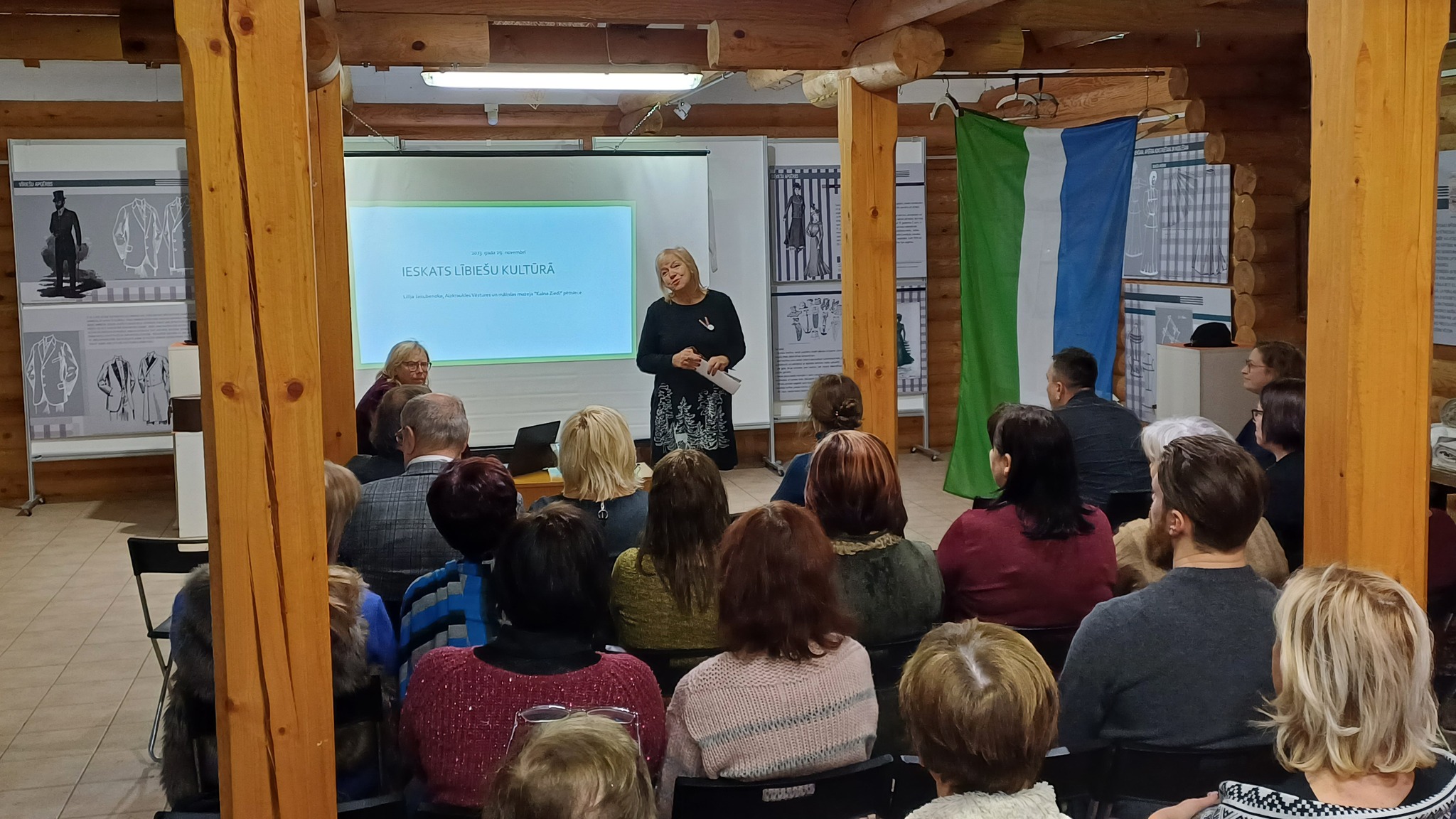
November 28
A cultural exchange cooperation project has been approved, joint events of Livonian, Cornish and Gaelic musicians and talks about endangered cultures will be held in Great Britain in 2024.
Livonian culture will be represented in the project by the Livonian singer, musician and songwriter Julgī Stalte.
November 27
Meeting of the experts and parliamentary secretary of the Ministry of Education and Science, Silvija Reinberga, with the head of the Livonian Institute, Valts Ernštreits, to discuss measures for learning the Livonian language and about the culture.
During the meeting, Valts Ernštreits expressed his satisfaction that the Ministry of the Interior has created an opportunity to support the preservation of the Livonian language, as the number of children and young people who show a desire to learn the language is increasing. The parliamentary secretary of the Ministry of Interior, Silvija Reinberga, thanked the Livonian Institute and everyone who, with their work, is ensuring the preservation of the Livonian language and culture, which is important not only for Latvia, but also globally. She emphasized that thanks to the work of Livonian culture and language enthusiasts, the Ministry of Education and Culture has the opportunity to financially support meaningful and well-thought-out initiatives that provide high added value to the education of children and young people.
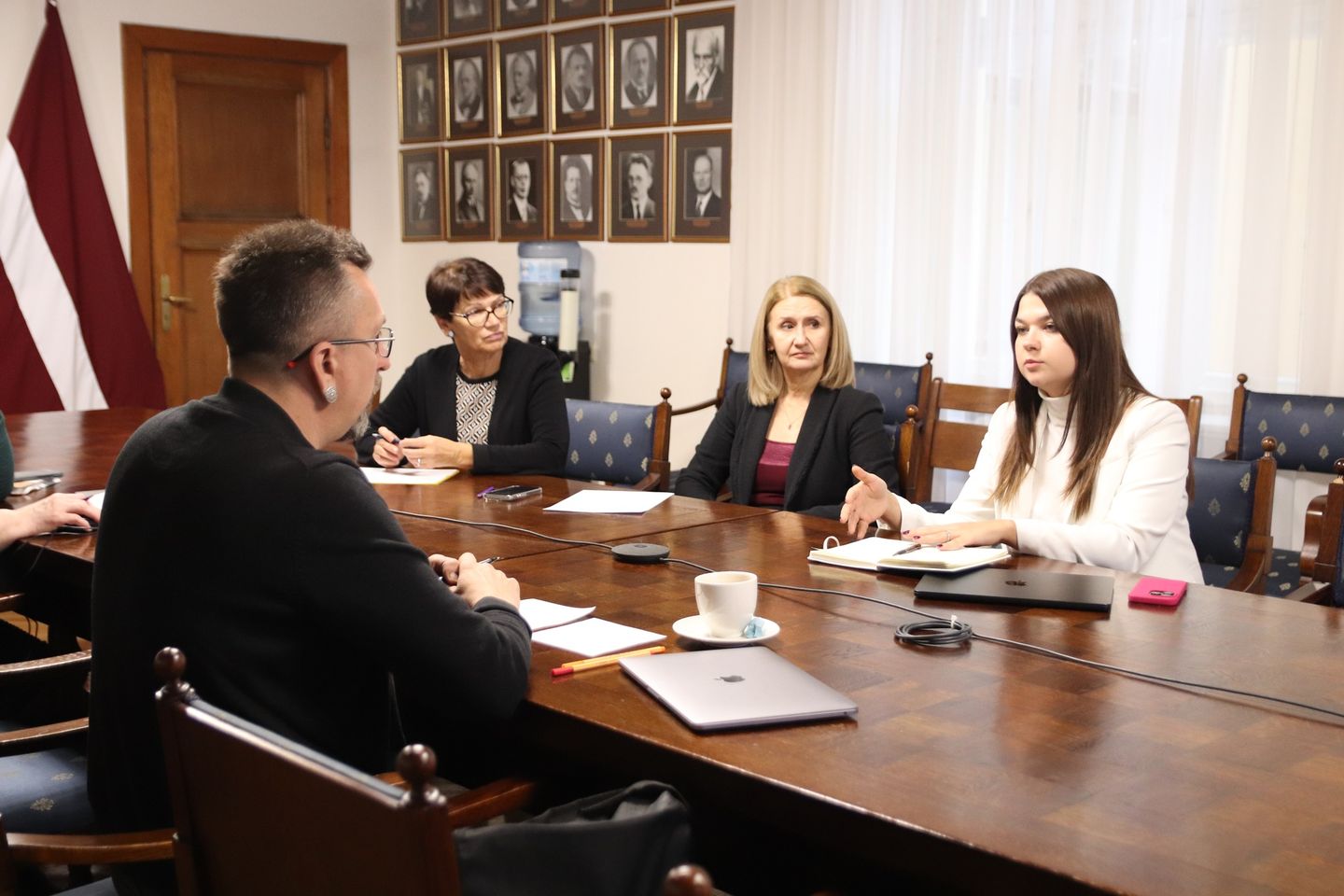
November 23-24
The 28th international scientific conference “Vārds un tā pētīšanas aspekti” (“Words and aspects of their research”) was held at the University of Liepāja.
At the conference, researchers and students presented and discussed various language research issues. Gunta Kļava, a researcher of the institute, added to the diverse range of topics of the conference, talking about the role of the Livonian language in the modern Livonian community.
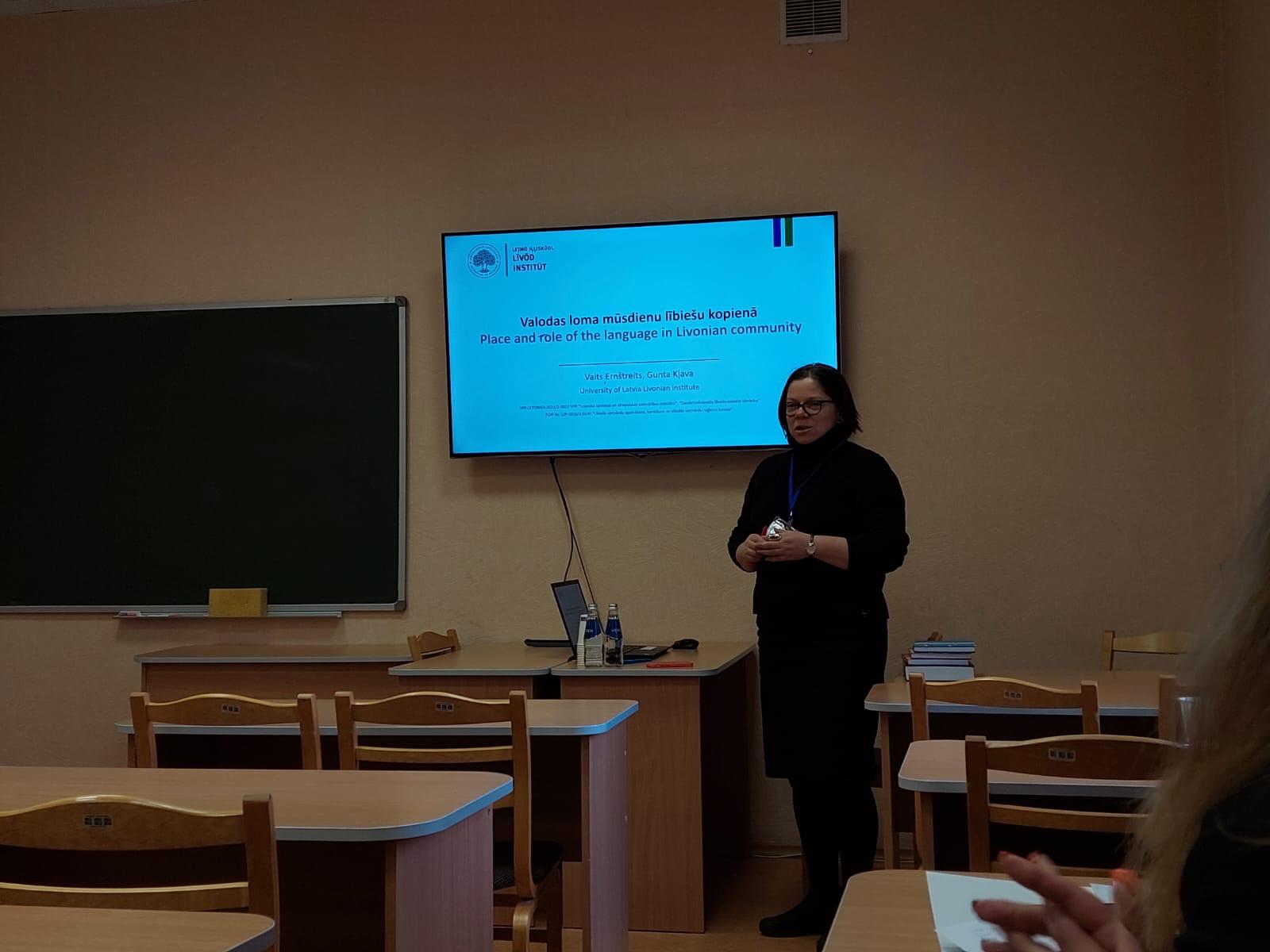
November 22
Congratulations to our colleague, researcher Milda Kurpniece, for her first translation of a novel which is also closely related to Livonians.
Andrus Kivirähk’s novel “Rehepapp ehk November” (Lithuanian – “Jaujininkas”), translated by Milda from Estonian to Lithuanian, has been published. A little-known but notable fact is that, while writing the novel, its author thoroughly familiarized himself with, and was inspired by, the images of Livonian folklore collected in the five-volume edition “Liivi rahva usund” (Beliefs of the Livonian people) compiled by Oskar Loorits, a friend of Livonians and a collector of folklore.
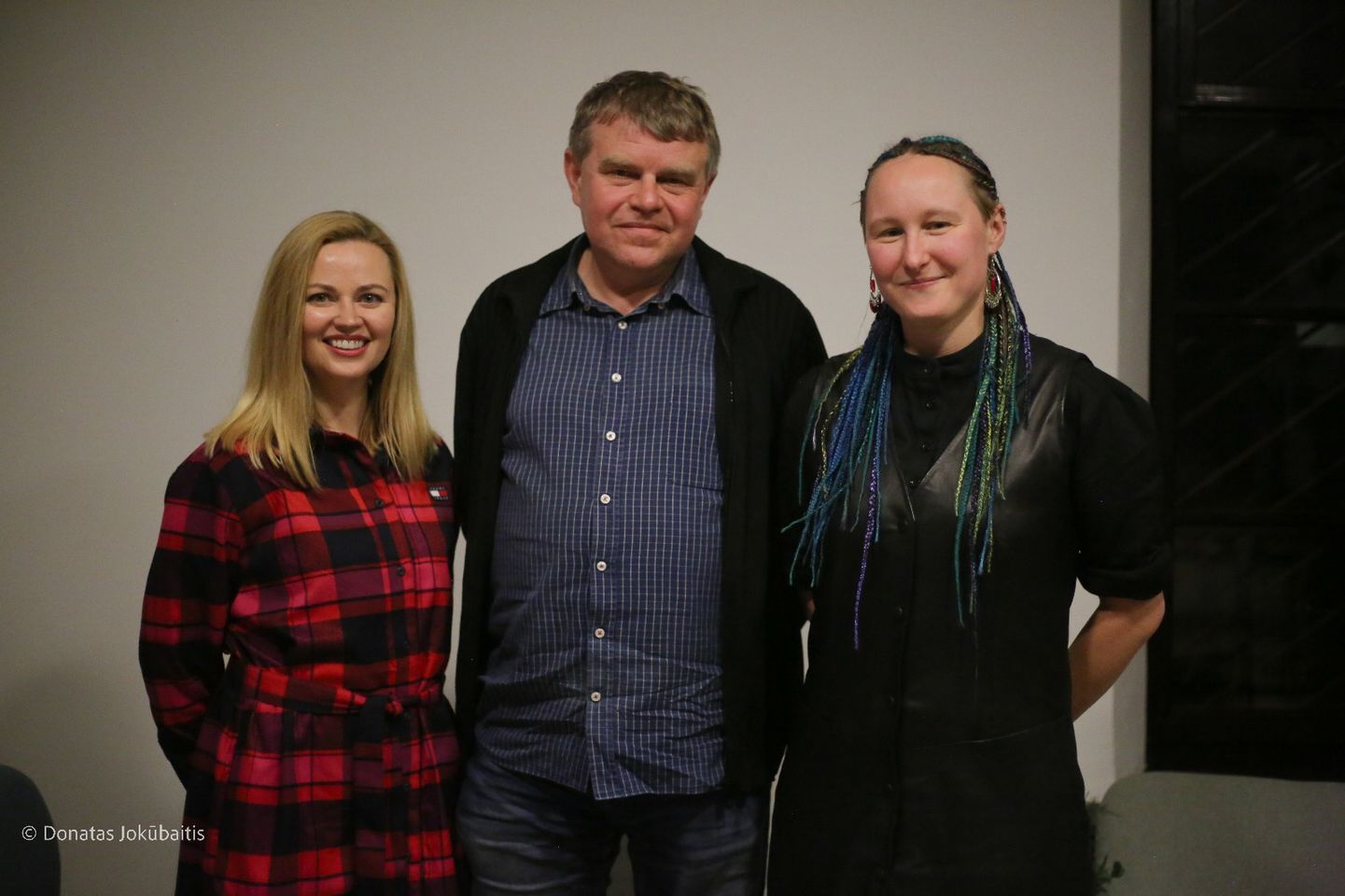
November 19
100 years ago, on November 18, the Livonian flag was raised for the first time in Mazirbe. On November 19, 2023, the celebration of the 100th anniversary of the Livonian flag organized by the Livonian Union took place in the Spīķeri concert hall in Riga.
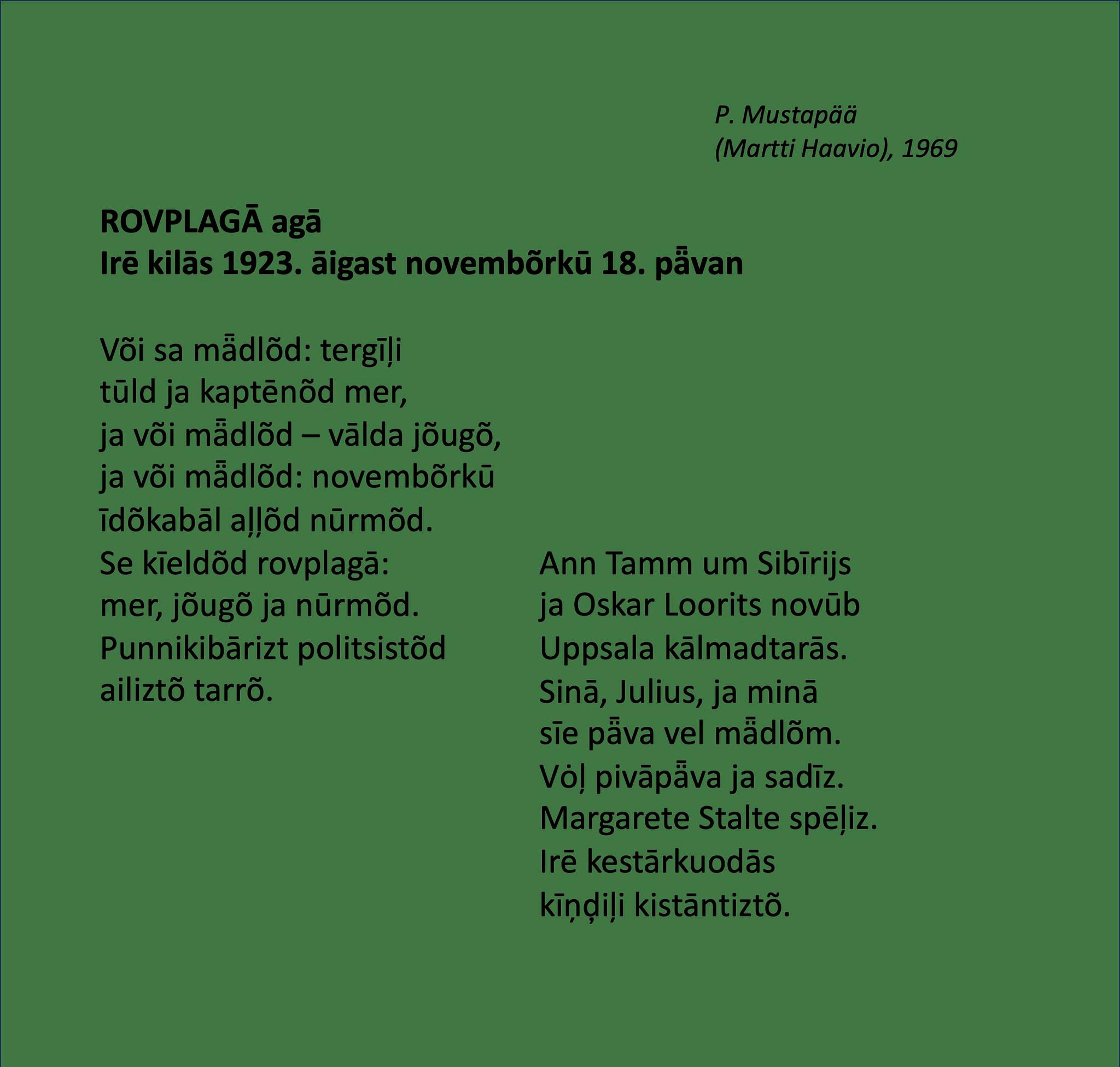
November 18
A new flag for Limbaži county! On November 18, celebrating the day of the proclamation of the Republic of Latvia, as well as the 100th anniversary of the Livonian flag, the new flag was raised at the municipal building of the Limbaži region.
The Livonian heritage along with the colors are woven into the new Limbaži county flag. Congratulations on the excellent initiative, which will probably serve to light the way for other counties to highlight Livonian roots and heritage.
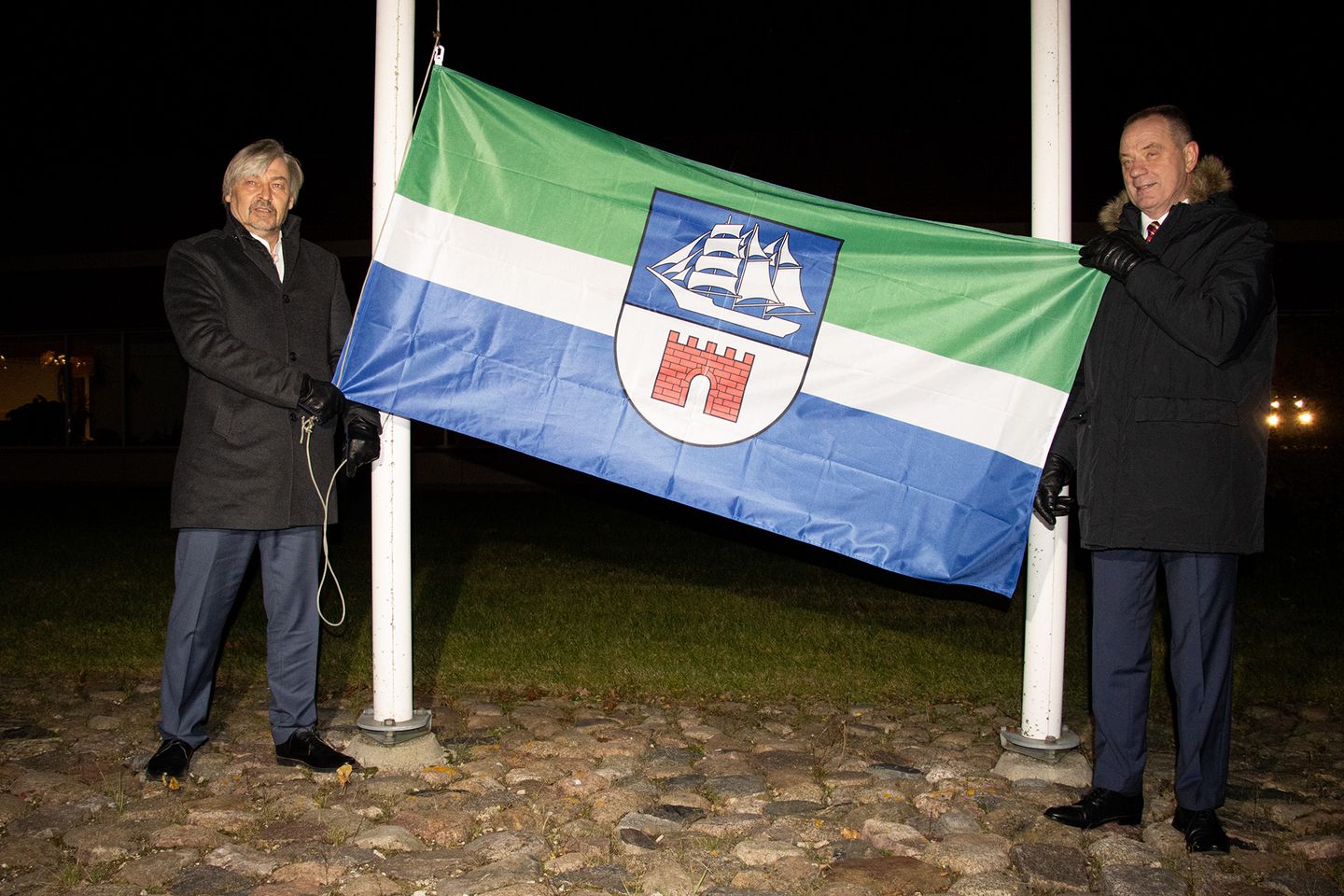
November 18
Celebrating the 105th birthday of the Republic of Latvia, Riga is currently decorated with images of quilts in the collection of the Latvian National History Museum. Among them is also a blanket woven by Katrina Zēberga, a Livonian storyteller.
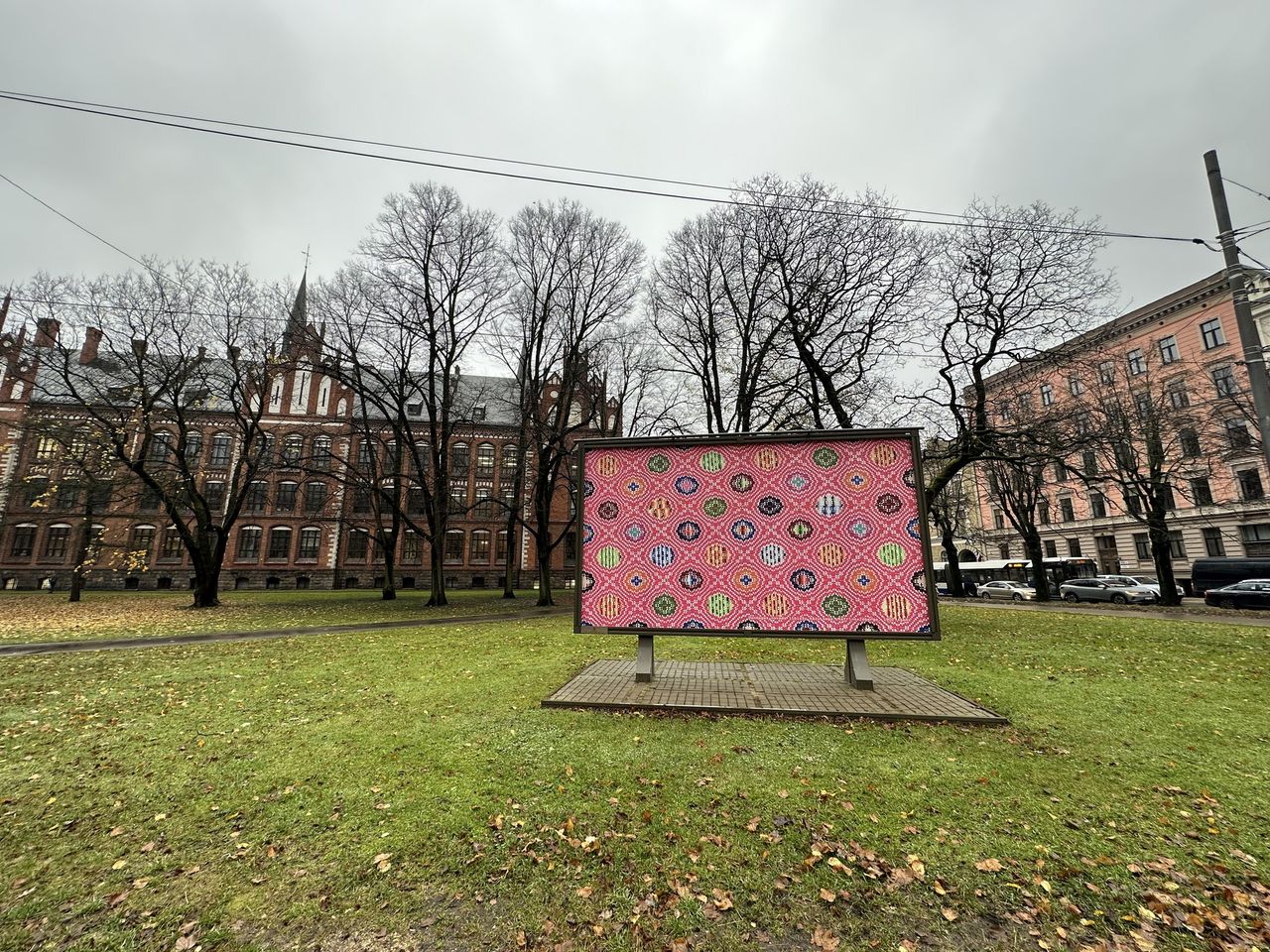
November 17
In honour of the centenary of the Livonian flag and the Year of Livonian Heritage, an exhibition about the traces of the Livonians that can be seen there has been opened at Sõrve Cape on Saaremaa.
Livonians have had close historical ties with Saaremaa, which is located across the sea only 30 kilometers from the Livonian coast. Up until the middle of the 20th century, inhabitants of Saaremaa were frequent guests on the Livonian coast – children went to the Livonians to graze cattle in the summer, while husbands went fishing in Livonian boats. The inhabitants of Saaremaa who remained on the Livonian coast are evidenced in certain surnames from Northern Kurzeme, while the traces of the Livonians can be seen in Saaremaa, for example in the names of the cardinal directions in the language spoken by the people of Saaremaa.
November 16
In the series of talks organized by the Institute of Public Law and Arvīds Dravnieks “17 autumn talks on national identity in Europe”, there was a discussion with the director of the Livonian Institute, Valts Ernštreits.
November 14
The book exhibition “Minā um līvli” (“I am Livonian”) dedicated to the Year of Livonian Heritage has been unveiled in the Humanities Library of the University of Latvia.
The exhibition can be viewed in the library from November 14 to December 1.
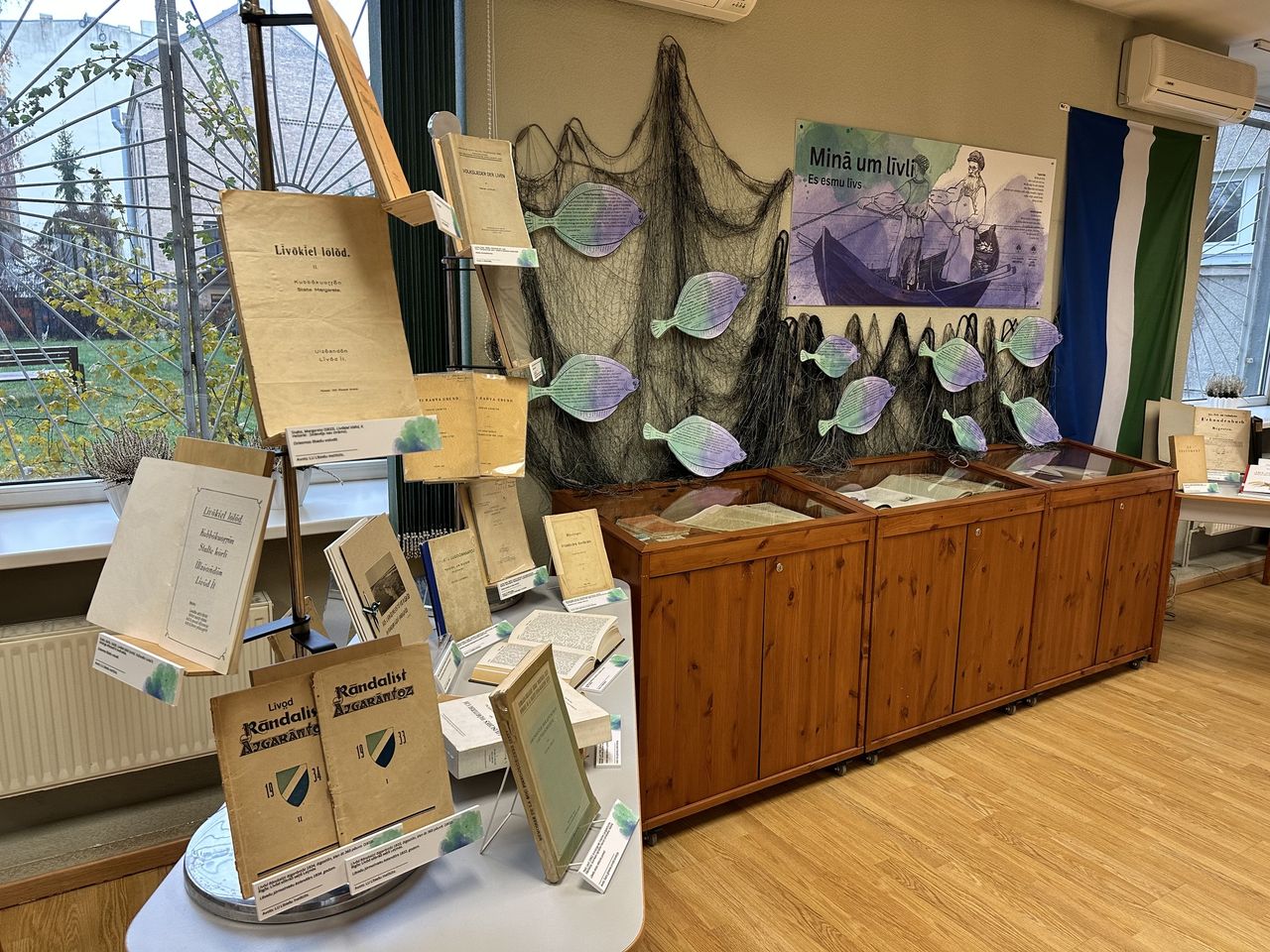
November 13
A concert program in the Livonian language “Seļļizt nemē mēg / People like us” was broadcast in the studio of Latvijas Radio 1 and “Klasikas” live.
The concert program included the poetry of four professional Livonian poets – Baiba Damberga, Valts Ernštreits, Kēmpi Kārl (Karl Pajusalu) and Kārlis Stalte – which echoed in the original compositions of Elīna Ose, Austris Kalniņš and Ernests Mediņš.
The event was also attended by one of the Livonian poets – Valts Ernštreits, director of the Livonian Institute of the University of Latvia, giving an insight into Livonian poetry and culture.
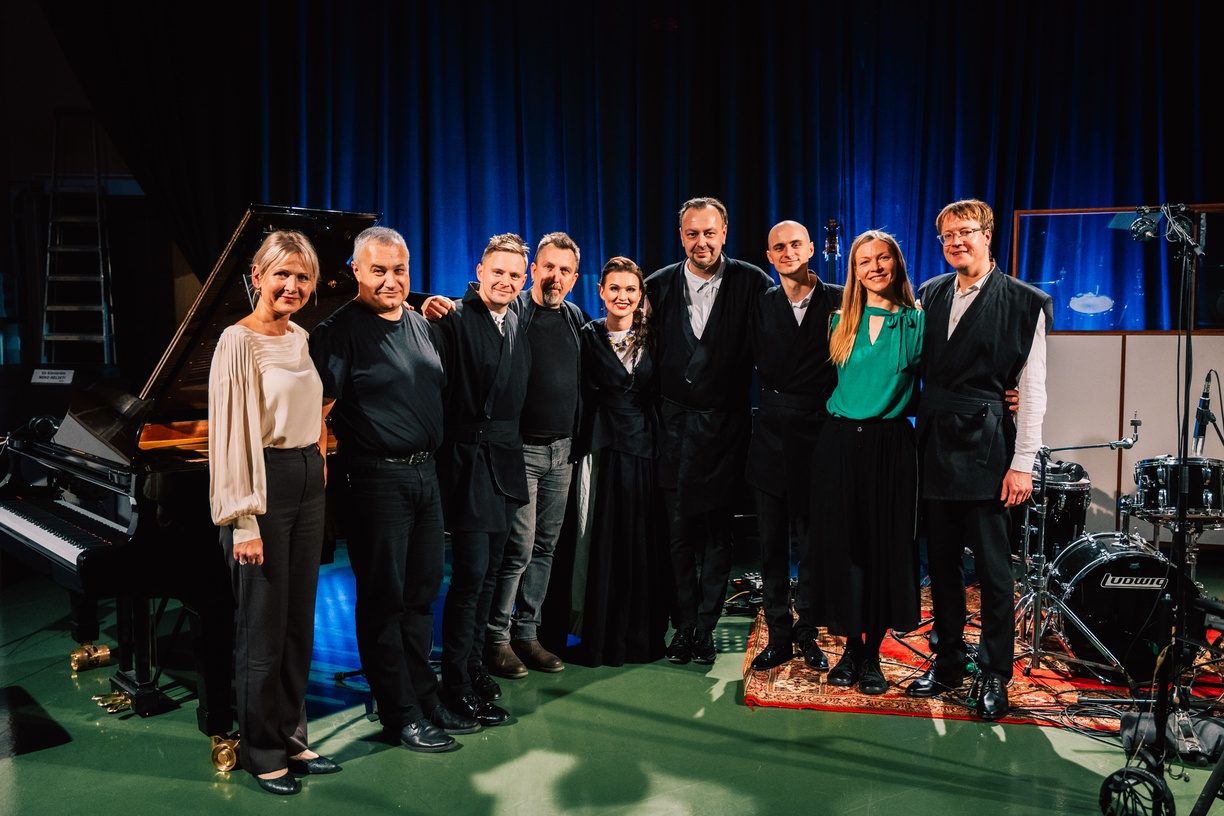
November 9
The Estonian Language Institute held a seminar on Finno-Ugric languages and dialects.
As part of the seminar, the researcher of the Estonian Language Institute, Sven Erik Soosaar, presented the paper “Kas liivlased solvuvad?”, in which he talked about the problems of creating our basic Livonian lexicon, which is being created in a project jointly implemented by the Livonian Institute and the Estonian Language Institute.
November 9
At the 42nd session of the UNESCO General Conference, the Minister of Culture Agnese Logina spoke, emphasizing Latvia’s success in strengthening cultural heritage – among them, the activities of the Year of Livonian Heritage.
At the beginning of the year, the Year of Livonian Heritage was announced by the Livonian Institute of the University of Latvia, the Latvian National Commission for UNESCO and the Latvian National Cultural Center, which is still ongoing. It has been able to mobilize and draw public attention to the Livonian roots of Latvia, to make us notice the Livonian around us and to promote the visibility and recognition of the Livonian heritage – from ancient places to tradition, to modern culture, language, and belonging.
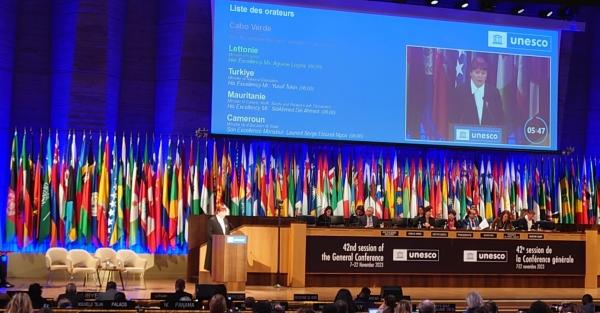
November 9
The scientific-practical conference of the Turaida Museum Reserve is taking place.
The year of the Livonian heritage and of the cultural heritage of the Gauja Livonians are particularly emphasized at the conference this year. The director of the Livonian Institute, V. Ernštreits, made a presentation at the conference: “Traces of the Livonian language in the place names of the Livonian lands of the Gauja”.
The Turaida Museum Reserve has prepared useful educational materials about the Livonian heritage in Turaida throughout the year of Livonian heritage. They are available on the Facebook page of the museum reserve.
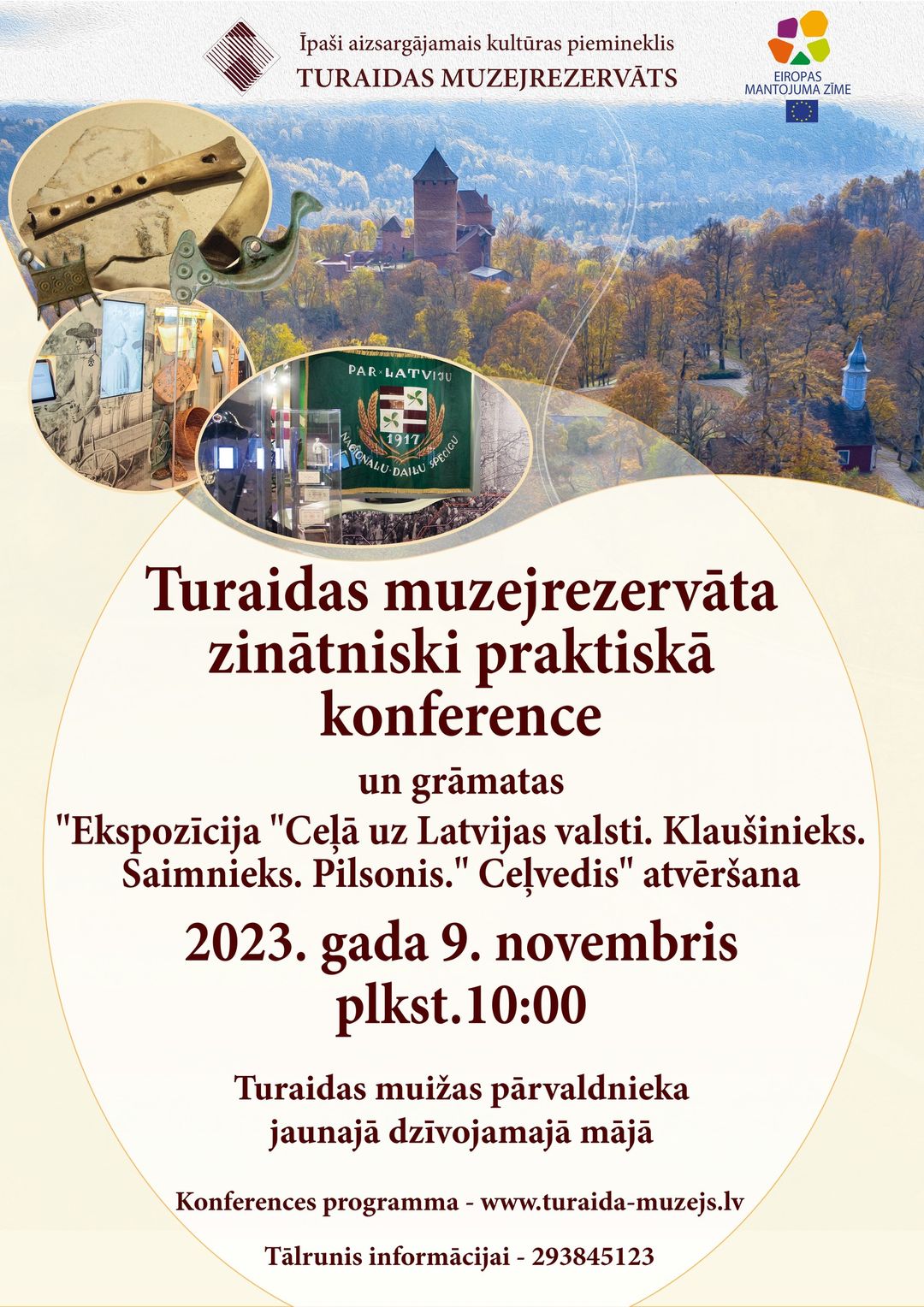
November 2
Ķempi Kārl has received an award for his collection of poetry.
Karl Pajusalu (pen name Ķempi Kārl), a member of the Scientific Council of the Livonian Institute has received the Estonian Ministry of Education and Science’s Kindred Peoples’ prize in literature for the collection of poetry in the Salaca Livonian language “Ēzkyrdiz vīzd” (Types of Closeness).
November 1
The Youth Conference “Apzinies savas saknes, lai veidotu spēcīgu personību nākotnē” (“Aware of your roots in order to build a strong personality in the future”) was held at Ventspils 1st State Gymnasium.
The conference was attended by more than a hundred youngsters from Ventspils town and region and from the regions of Kuldīga and Talsi. It was opened by the chairman of the municipal council of Ventspils, Jānis Vītoliņš, and the deputy executive director for education and culture, Ineta Tamane. The Livonian Institute of the University of Latvia talked about the possibilities of researching the Livonian people and their heritage for students and about the folklore of the Livonian people. A separate part of the conference was dedicated to the scientific research works and initiatives of the students themselves, four of whom made presentations regarding Livonians.
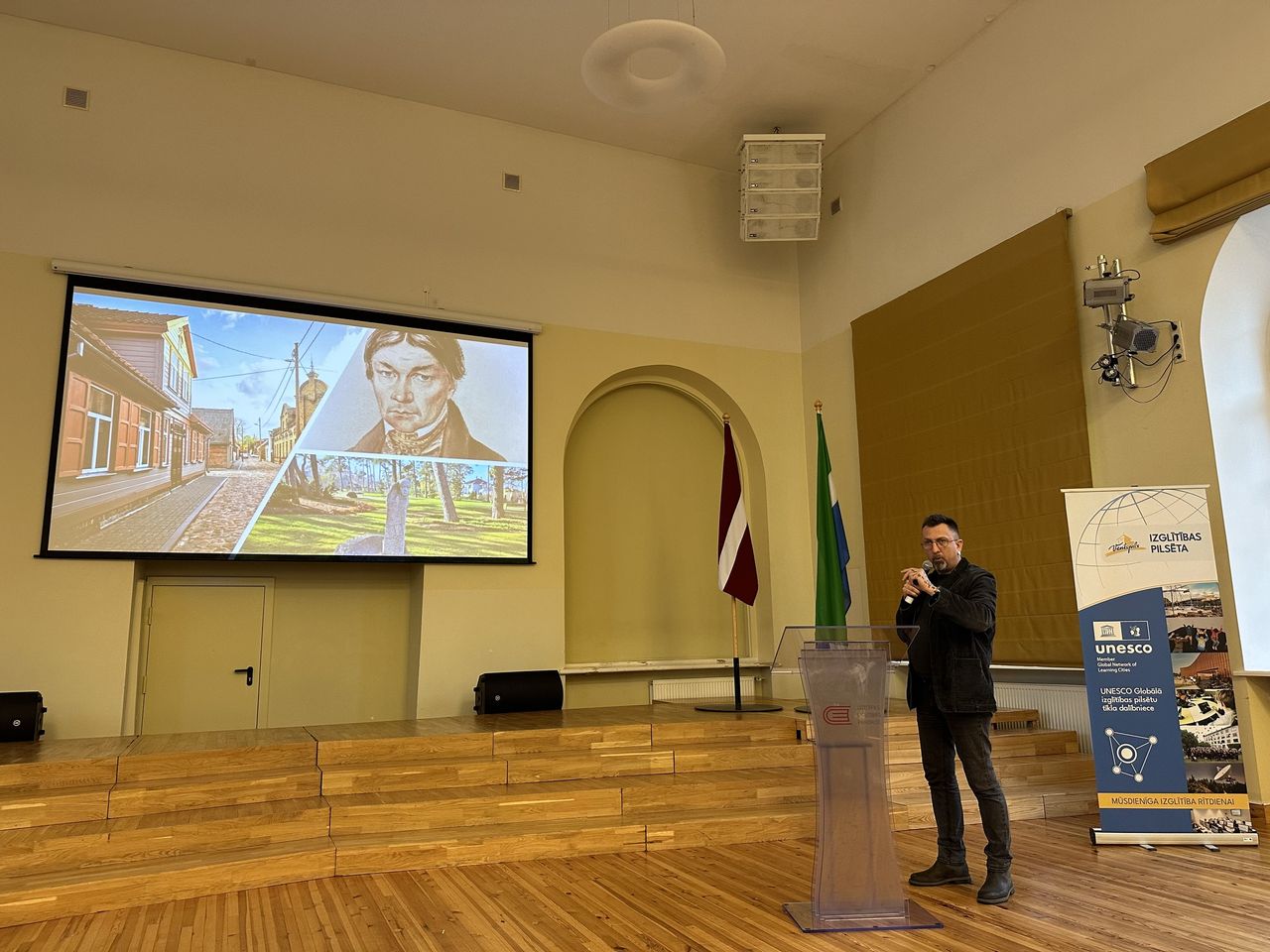
October 30
Meeting with Sven Erik Soosaar (Estonian Language Institute) about the current situation regarding the development of the Estonian-Livonian dictionary.
The work is carried out as part of the project “Atvērtas un FAIR principiem atbilstīgas digitālo humanitāro zinātņu ekosistēmas attīstība Latvijā” (Development of an open and FAIR-compliant digital humanities ecosystem in Latvia) (No. VPP-IZM-DH-2022/1-0002), which is implemented within the framework of the State Research Program “Humanitāro zinātņu digitālie resursi” (Digital Resources in the Humanities).
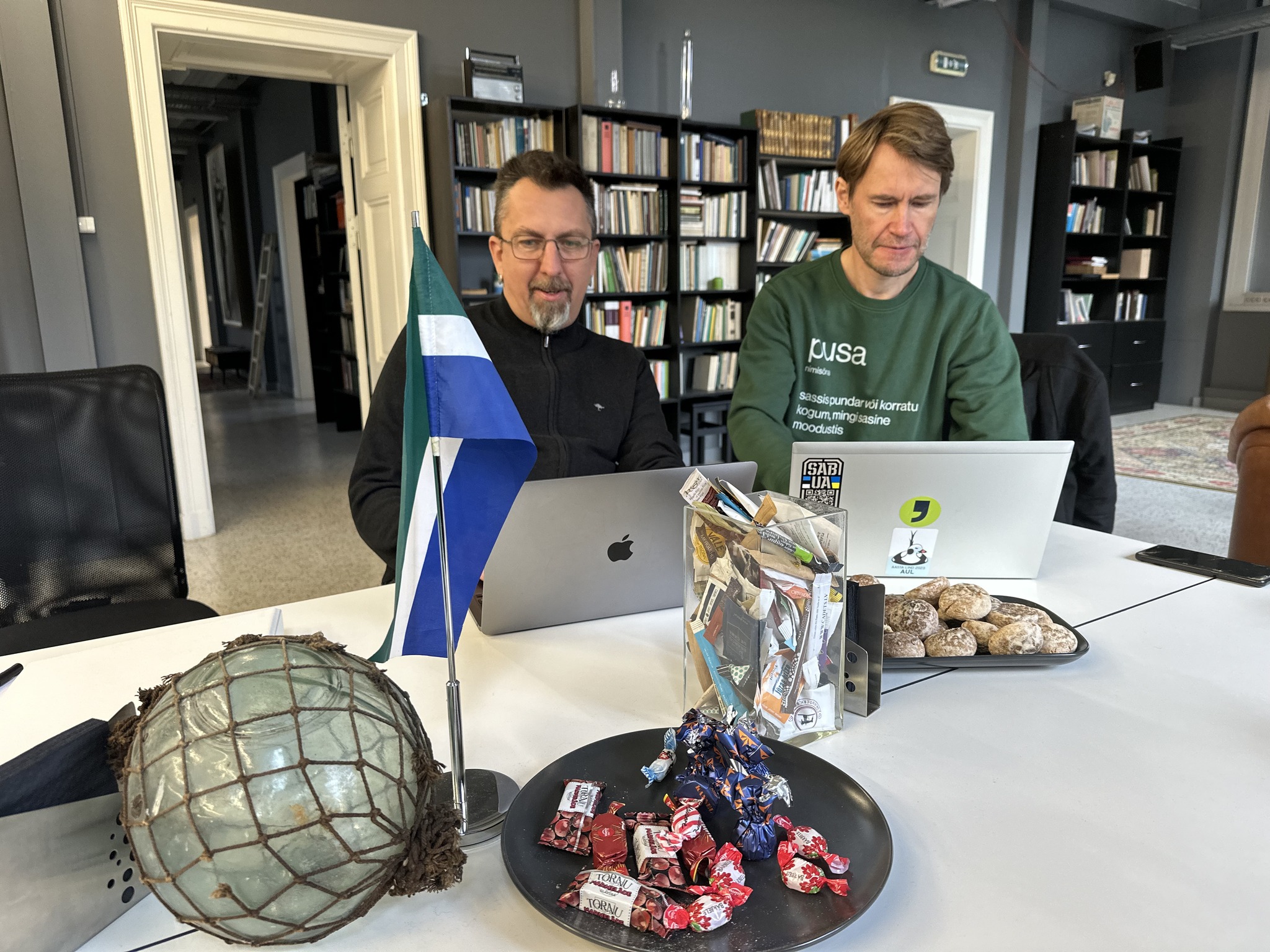
October 19
At the cultural center of the Sigulda region “Siguldas devons”, the UNESCO Latvian National Commission cooperation network conference “Cultural literacy for cooperation: in search of a common language” is taking place.
Gunta Kļava, lead researcher of the Livonian Institute of the University of Latvia, and visiting researcher Lolita Ozoliņa, who is also a researcher of the Livonian cultural space of Vidzeme, talked about the intangible cultural heritage of the Livonian people and its role in the modern cultural space in Latvia.
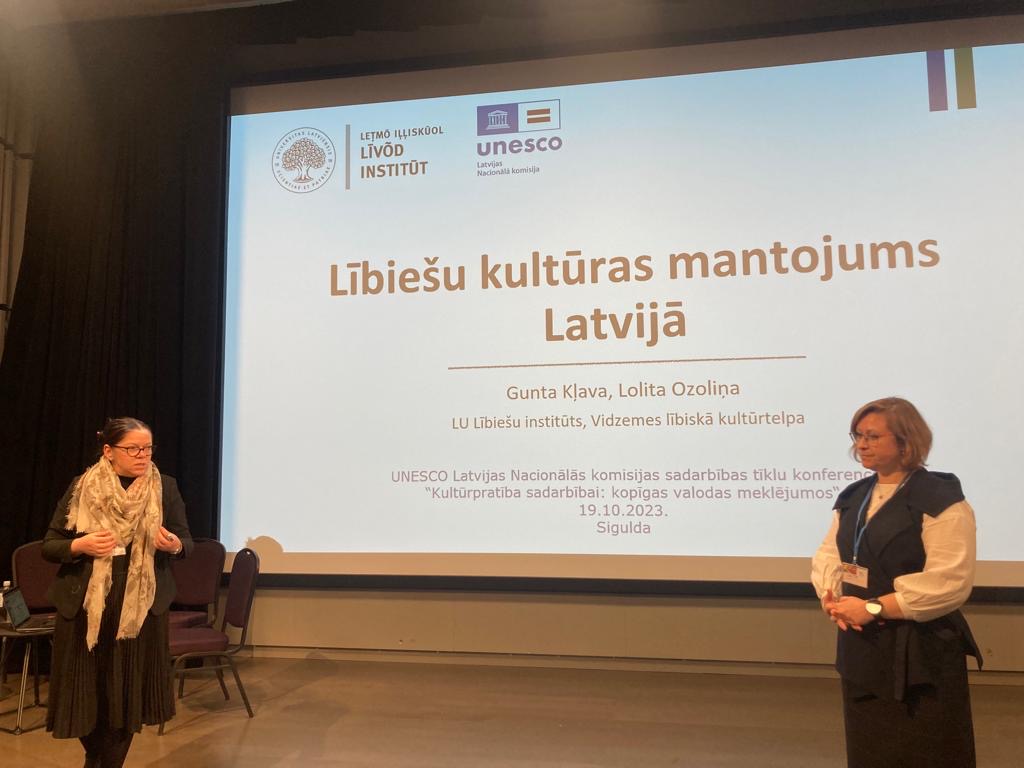
October 19
As part of the Days of Kindred Peoples, a conference dedicated to the theme of Kindred Peoples will be held in Tallinn, Estonia.
This time, in line with the Year of Livonian Heritage, the conference is dedicated to the theme of the Baltic Sea Finns living in Latvia – along with the Livonians, the conference reports will examine the Leivu people who once lived in the vicinity of Lejasciems and Gaujiena, the Estonians of Ludza and the branch of the Latvian Vots – the Russians who lived in the vicinity of Bauska. It is particularly exciting that the conference was filled with songs by Livonian children and youngsters from their summer school “Mierlinkizt”, symbolically showing the continuation of the Livonian identity and looking towards the future.
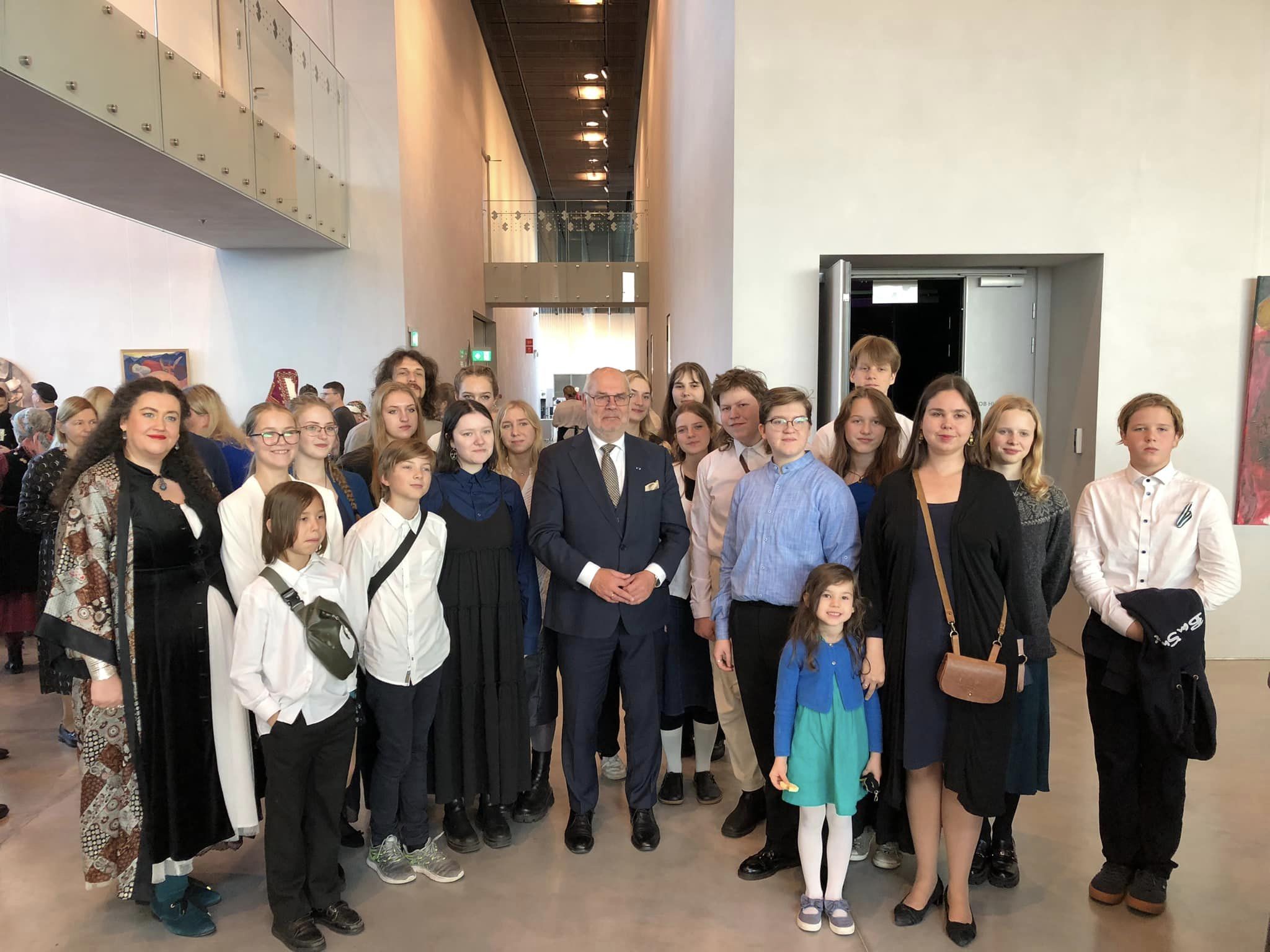
October 18–19
As part of the Year of Livonian Heritage, the Kindred Peoples’ Days held in Estonia also includes events where poetry can be heard in the Livonian language.
On October 18, the Livonian poet Valts Ernštreits took part in the poetry evening “Smugriluuletrall 2023”, while on October 19, excerpts from Kārļis Vērdiņš’ forthcoming book of poetry “Livonian ballads” alongside Valts Ernštreits’ readings in Livonian will be heard at the Embassy of the Republic of Latvia. The evening of poetry was introduced by a discussion (in English) by Kārļis Vērdiņš and Valts Ernštreits about the contemporary culture of the Livonian people and the role of the written word in the maintenance of the Livonian language and culture. The poetry evening was opened by Kristīne Našeniece, Ambassador of the Republic of Latvia to the Republic of Estonia.
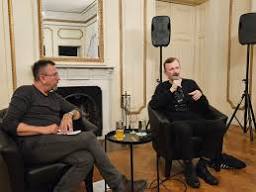
October 14
The Vidzeme Livonian Heritage Space conference “Vidzemes lībiskās kultūrtelpas vērtības – aktuālais un atklātais” (The Values of the Vidzeme Livonian Heritage Space – the urgent and the unearthed) took place at Svētupe Manor.
At the conference, V. Ernštreits spoke about Livonian placenames in Vidzeme and L. Ozoliņa – who led the event – discussed what was accomplished in the Vidzeme Livonian Heritage Space during the Livonian Heritage Year.
Karl Pajusalu and Eberhard Winkler’s book “Salacas lībiešu valodas ceļvedis” (A Guide to Salaca Livonian) was also unveiled at the conference. This publication is devoted to the best documented variety of Vidzeme Livonian, which was the Salaca Livonian language spoken in the area near Svētciems. The book was published by the UL Livonian Institute Support Association (LU Lībiešu institūta atbalsta biedrība / LI Līvõd institūt tigtimiz seļtš).
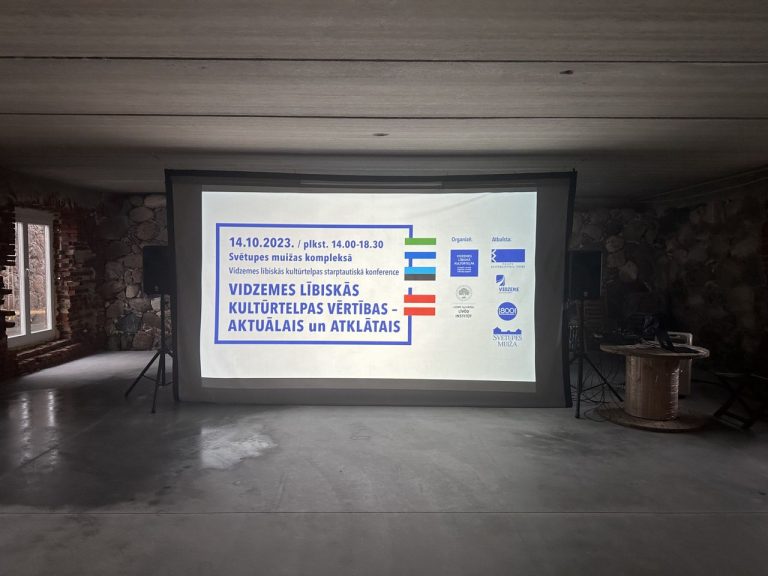
October 9
UL Livonian Institute director V. Ernštreits is participating in the European Organization for Nuclear Research (CERN) Baltic Conference (CBC 2023) at Rīga Technical University.
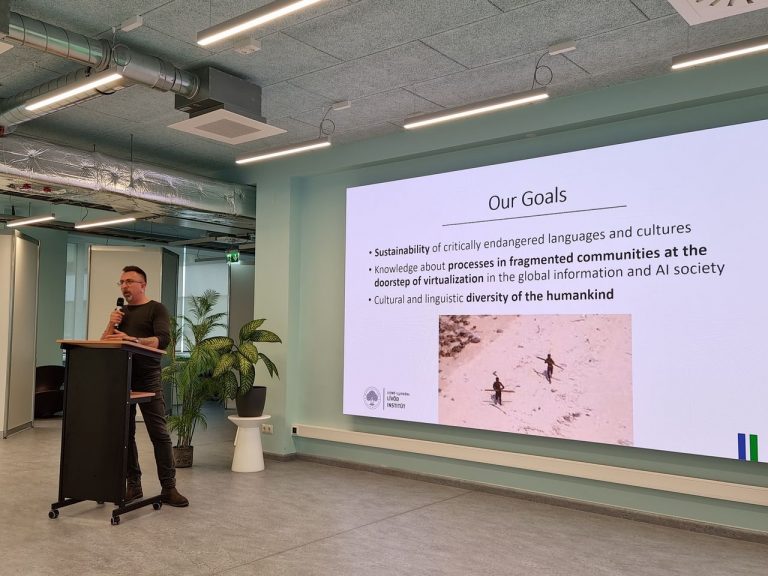
October 5–6
The international conference “Finnic Contacts” / “Läänemere kontaktid” took place at the University of Tartu and was held in memory of Livonian and Finnic languages researcher Prof. Tiit-Rein Viitso (1938–2022).
The UL Livonian Institute participated in the conference with four presentations, which described the life and work of Tiit-Rein Viitso, the intergenerational transmission process of Livonian, Livonian grammar and placenames.
The conference presentations: V. Ernštreits “Naming of places in Livonian”, U. Balodis, T. Tuisk, M. Norvik, K. Pajusalu “Tiit-Rein Viitso – a prominent researcher of Finnic contacts”, G. Kļava, V. Ernštreits “Place and role of the Livonian language today”, M. Kurpniece “Livonian jussive in an areal context”.
The conference programme and information about it are available here.
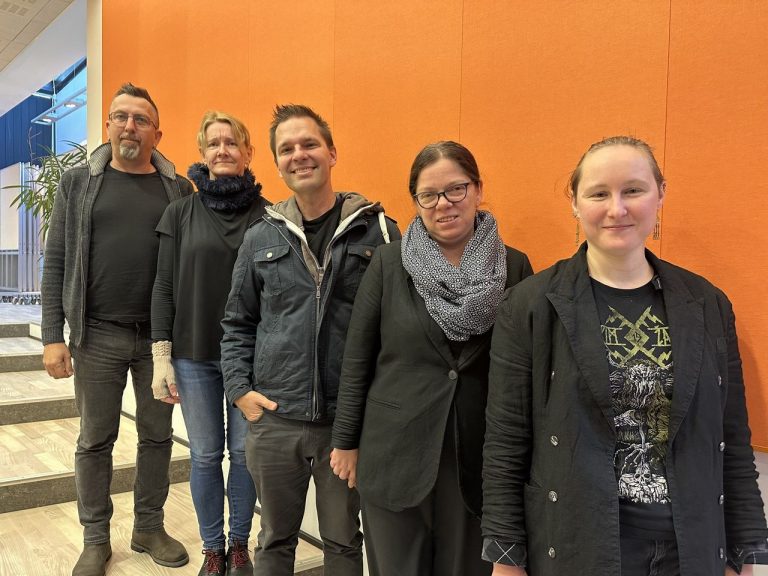
October 4
The book unveiling event for T. Tuisk and M. Norvik’s “Līvõ kīel optõbrōntõz. Liivi keele õpik” (A Livonian Textbook) took places at the University of Tartu Institute of Estonian and General Linguistics library.
October 2
Livonian Institute researcher Uldis Balodis spoke about a possible Finnic borrowing in the Baltic Yatvingian language at the Workshop on Fragmented Languages jointly held by the Western Institute for Endangered Language Documentation (WIELD) and James Cook University’s Language and Culture Research Centre.
U. Balodis’s talk is available on WIELD’s YouTube channel.
September 28
The first-year students of the UL Faculty of Social Sciences Department of Communication Studies visited the UL Livonian Institute.
As part of their research, the students wanted to learn about the UL Livonian Institute and also the Livonians. Together we discussed topics such as the origin of the Institute and its work, internal and external communications, as well as examined all sorts of books and objects associated with the Livonians.
According to the students: “Valts and Milda warmly welcomed us, served us coffee and tea, and gave detailed answers to every question that interested us. It was a really pleasant and cosy atmosphere. We encourage everyone who is interested to take advantage of the opportunity and visit the Livonian Institute! Many thanks for such a wonderful welcome!”
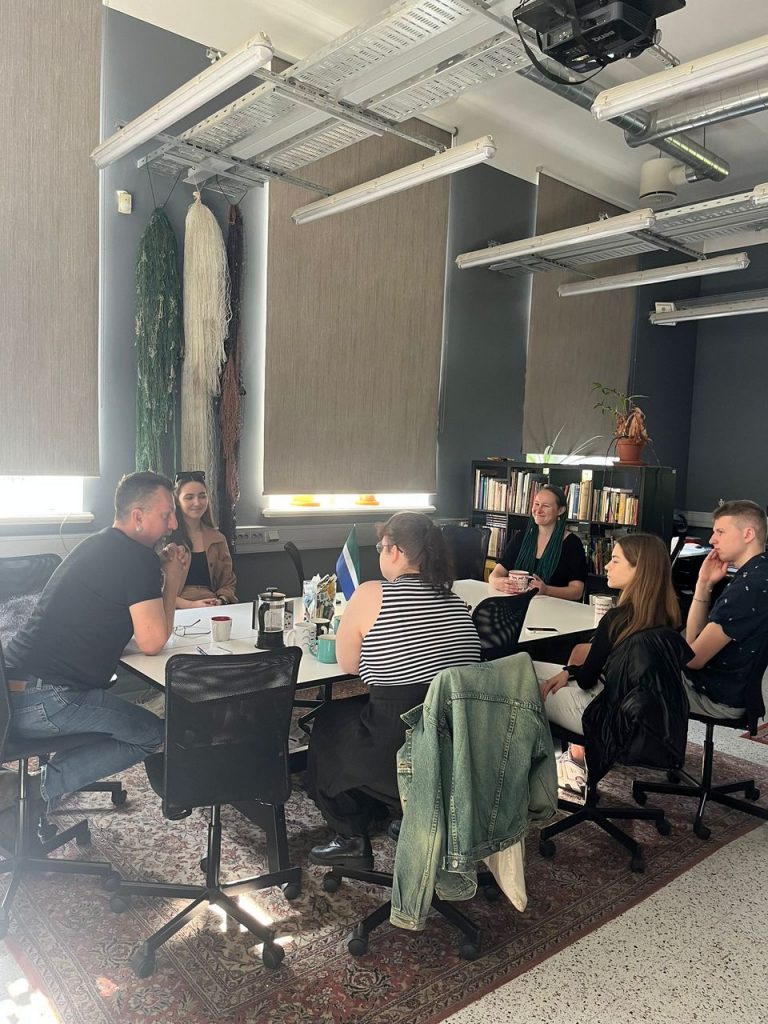
September 26
As part of commemorating the European Day of Languages, the UL Livonian Institute director visited the State Land Service in order to ensure that Livonian and Latgalian placenames can be used in the State Land Service’s information system kadastrs.lv in the near future.
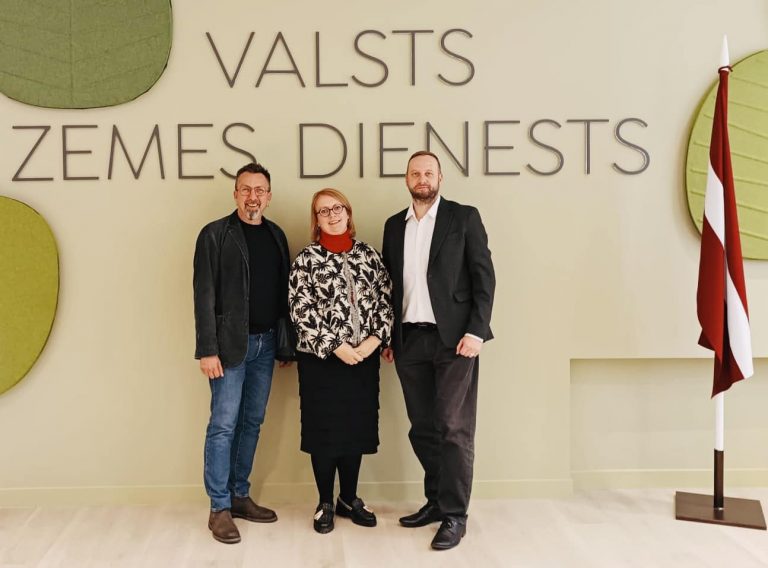
September 23
The Rēzekne Academy of Technologies hosts the Intermediate Latgale Congress.
The UL Livonian Institute director participated as an expert in the intermediate congress’s working group for Latgalian language acquisition.
September 22–23
The seminar “Lībiskā un kursiskā simbioze Ziemeļkurzemē” (Livonian and Curonian symbiosis in northern Courland) was held at Talsi Regional Museum. The Talsi municipal government is organising the seminar with the goal of popularising Latvia’s Livonian roots and Livonian heritage.
The seminar speakers gave lectures on Livonian archaeological history, the preservation of Livonian heritage, Livonian foods, places, and personal names as well as on Livonian and Curonian folklore, mythology, and local history.
UL Livonian Institute researchers Ieva Vītola and Milda Kurpniece participated in the seminar. I. Vītola gave the presentation “Lībiskā mantojuma zīmes Ziemeļkurzemes piekrastes ainavā” (Evidence of Livonian heritage in the northern Courland coastal landscape) and M. Kurpniece – the presentation “Lībiešu folklora un mitoloģija” (Livonian folklore and mythology).
September 12
A delegation from the Estonian Ministry of Culture visits the UL Livonian Institute.
Our Estonian colleagues, who were on a visit to exchange and share experience, evaluated the work that the Livonians had done in developing their culture and were also interested in state support for Livonian language and culture. In our conversation we reached a shared conclusion regarding the importance of the knowledge and understanding of state employees at all levels of government for creating a modern and democratic society and state.
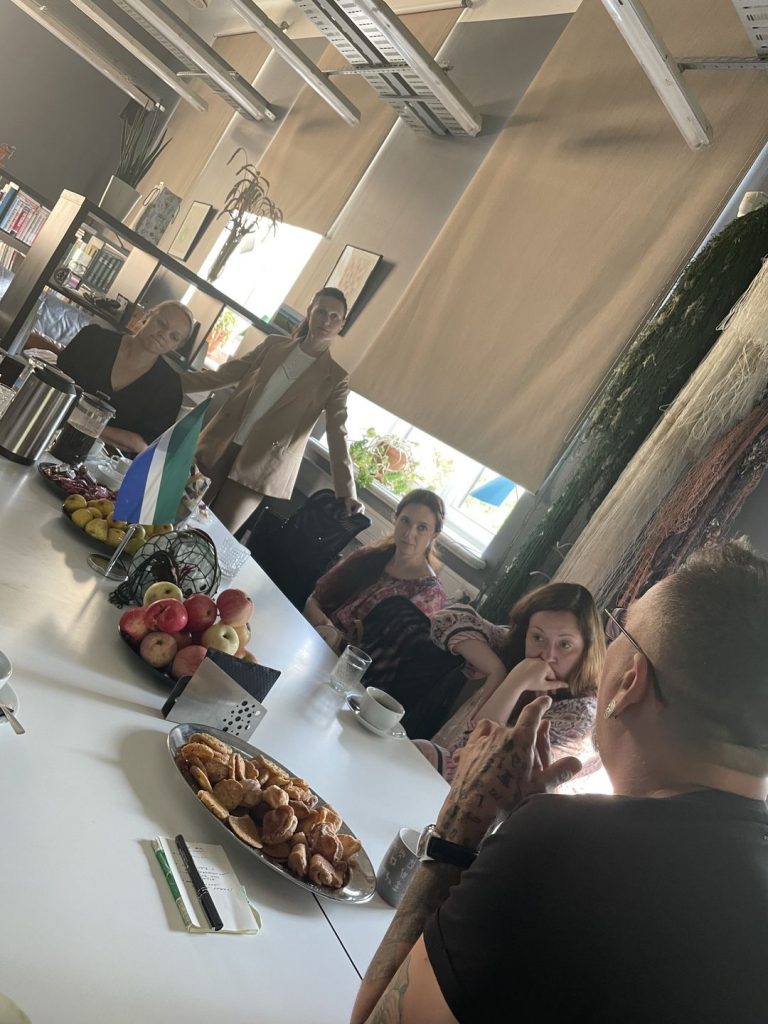
September 12
The UL Institute of Mathematics and Computer Science, digitalhumanities.lv, and Clarin-LV scientific conference “Jaunākie valodas resursi un rīki digitālajām humanitārajām zinātnēm” (The newest language resources and tools for the digital humanities) is held.
V. Ernštreits is participating in the conference with his presentation “Lībiešu valodas datu ieguve un tās nākotnes perspektīvas” (Livonian language data acquisition and its future prospects). More about the conference here.
September 8
Following an invitation by the Investment and Development Agency of Latvia, UL Livonian Institute director V. Ernštreits spoke with journalists from the Union of Journalists in Finland about Latvia, the Livonians, and Livonian heritage.
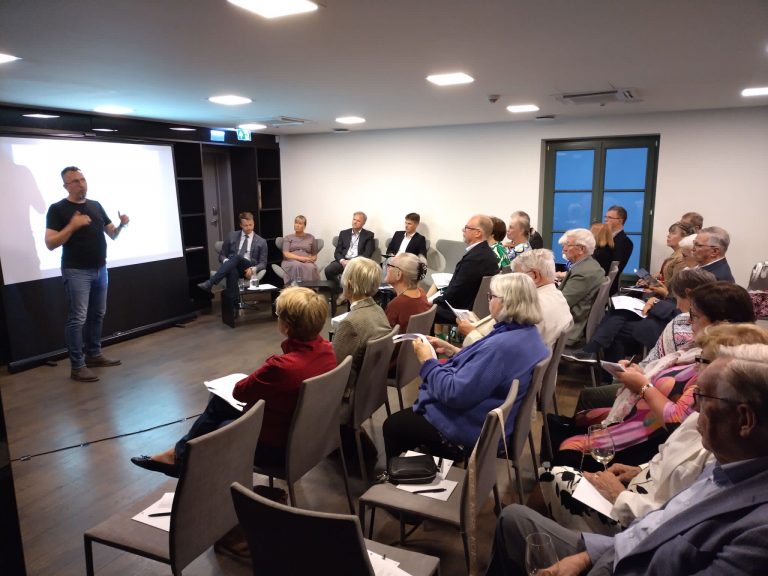
September 8
Poetry Days 2023 also will include a Livonian poetry night as a celebration of the Livonian Heritage Year.
During the event, poems will be read in Livonian with their translations in Latvian, allowing listeners to enjoy the sound of Livonian poetic language as well as the imagery of Livonian poetry from both sides of the Livonian Small Sea (Piški mer) – also known as the Gulf of Rīga.
The poetry of three modern-day Livonian poets – Baiba Damberga, Valts Ernštreits, and Ķempi Kārl – will be read at the event.
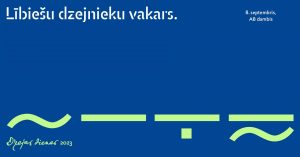
September 7
The book opening event for the article collection commemorating Karl Pajusalu’s 60th birthday “Tartu Ülikooli Lõuna-Eesti keele- ja kultuuriuuringute keskuse aastaraamat XXI–XXII. Pühendusteos Karl Pajusalule 60. sünnipäevaks” will be held at the University of Tartu.
The articles in the collection include one by our researchers Tuuli Tuisk, Marili Tomingas, and Valts Ernštreits about Karl Pajusalu’s great work in Livonian linguistics and culture.
September 7
A conversation about poetry in less spoken languages among the events at Poetry Days 2023.
In cooperation with the Irish embassy, Irish authors Seosamh Ó Murchú, Áine Uí Fhoghlú, Molly Twomey, and poetry translator Jānis Elsbergs will be participating in this event sponsored by “Literature Ireland”. Latgalian poet Anna Rancāne will also be participating in the event. The event will be led by Livonian linguist and poet Valts Ernštreits.
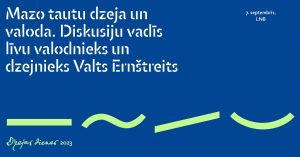
August 31
The Fundamental and Applied Research Programme project competition (2023) has supported the UL Livonian Institute project “Lībiešu valodas pārmantošana: zināšanas par kritiski apdraudētas valodas transmisiju mūsdienās kā pamats procesā balstītu valodas saglabāšanas un revitalizācijas instrumentu izveidē” (Continuity of Livonian: understanding of language transmission processes in a critically endangered contemporary indigenous community to develop process-driven instruments for preservation and revitalization) (principal investigator – Gunta Kļava), which will study Livonian language transmission processes.
The project competition supported 15 projects each in the Natural Sciences and Engineering and Technology groups, eight projects in the Medicine and Health Sciences group, seven projects in the Social Sciences group, while in the Agriculture, Forestry, and Veterinary Sciences and the Humanities and Art Sciences groups six projects were supported in each.
August 30
The researchers and implementers of the Aizkraukle municipality Culture administration project “Daugava Livonian traces in Aizkraukle” working group met at the Livonian Institute.
The project is being implemented with the support of the programme “The Vidzeme historical land’s cultural programmes 2023”, which was announced and is being administered by the Vidzeme planning region.

August 12
University of Tartu professor Karl Pajusalu and UL LI researcher Uldis Balodis spoke about the historical linguistic contacts between Malenia and Võru County at the opening of the 3rd Malenian Language Camp in Korneti.
The researchers also spoke about the importance Latvia’s Finnic – including its Lutsi – heritage and role in Latvia’s regional identities. Many thanks to linguist and active populariser of Malenian language and culture – Dace Markus – for the invitation!
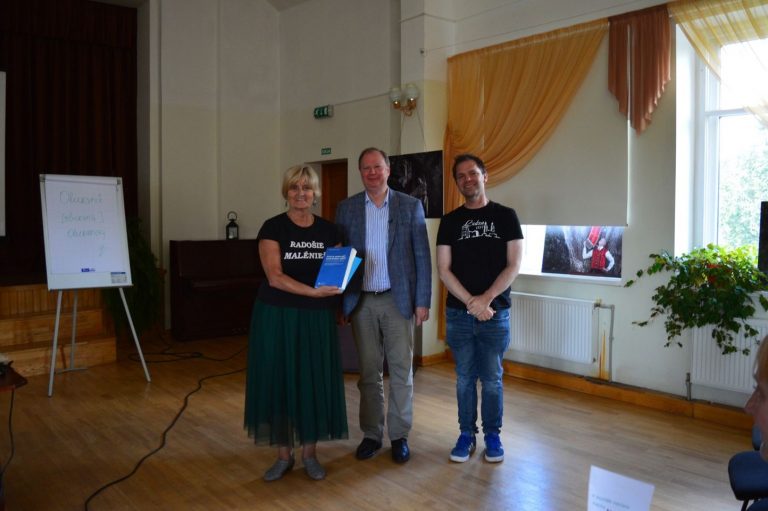
August 11
Estonian Public Media is creating a programme series about Estonian kindred nations. One of these programmes is about the Livonians.
This programme was filmed on the Livonian Coast, in Vidzeme and Rīga, and included meetings with Livonians as well as featured Livonian places and things. We also had the pleasure of welcoming the film crew and telling them about Livonian traces visible in Rīga and also the future for Livonian language and culture being created by the Institute.
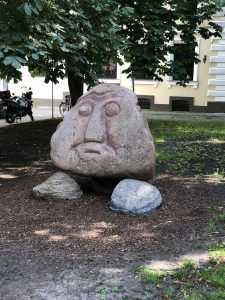
August 4
A conversation appears in the Estonian culture journal “Sirp” with two of the Institute’s researchers – Tuuli Tuisk and Valts Ernštreits. The conversation is about the Livonian Heritage Year, the UL Livonian Institute, the Livonian heritage of Vidzeme, and the Livonian language.
August 3
The Livonian Society of Friends visits the UL Livonian Institute from Estonia.
This year, the Livonian Society of Friends’ annual trip will continue on to the Livonian Coast and the Livonian Festival.
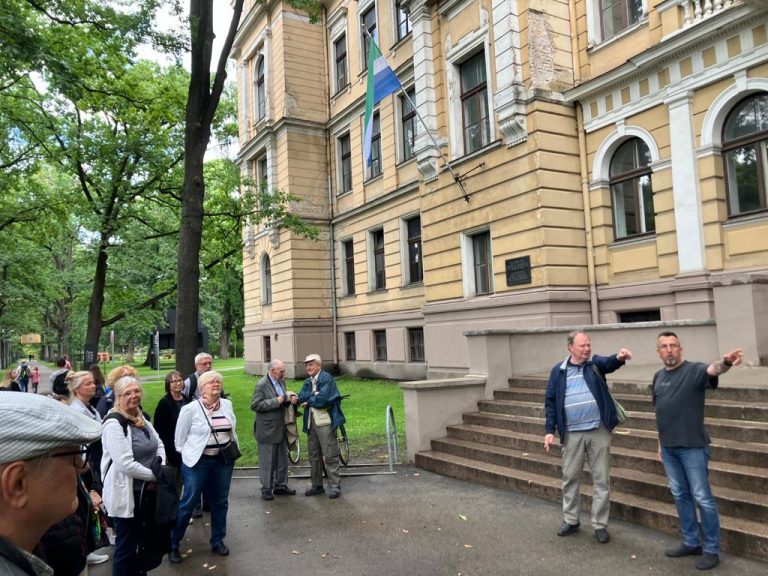
August 1
Sofia Bogdanova of the European Humanities University in Vilnius visits the UL Livonian Institute.
The student is writing her master’s thesis on state support mechanisms for the Livonians. Though Sofia is from Belarus, she chose this topic, because she also has Livonian roots, which can be found between Kūolka (Kolka) and Irē (Mazirbe).
July 28
UL Livonian Institute researchers V. Ernštreits and G. Kļava visited the teachers Katrīna and Irbe of the Livonian children’s and youth summer school “Mierlinkizt”, together with whom a study programme was developed for the beginner’s group.
The Livonian Institute was delighted to help the teachers prepare Livonian language lessons and also to include a short introduction about the Livonian language and its pronunciation.
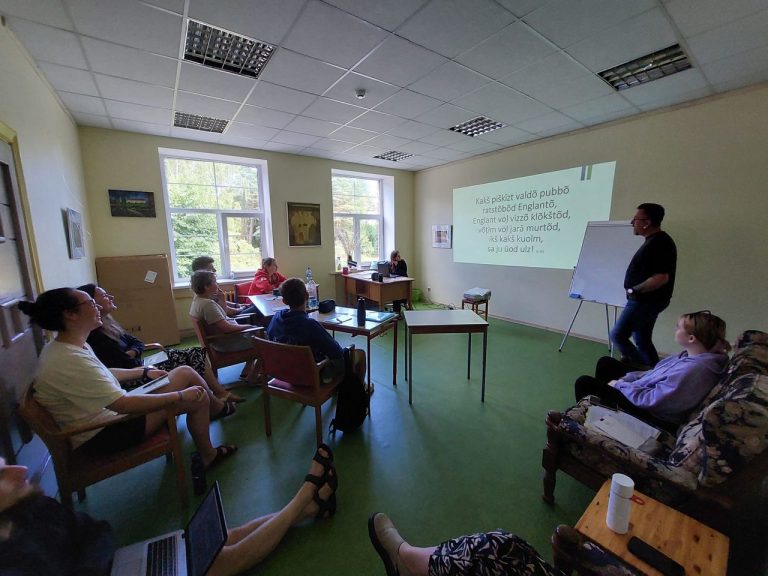
July 25
Preparations are being made together with Katrīna and Irbe for the Livonian children’s and youth summer school “Mierlinkizt”.
For the first time, Katrīna and Irbe will be teachers to those who are only starting to learn Livonian. We are delighted that the entire learning process for this group has been designed using the language course “Op līvõ kīeldõ / Mācies lībiešu valodu” (Learn Livonian), which was created by the UL Livonian Institute.
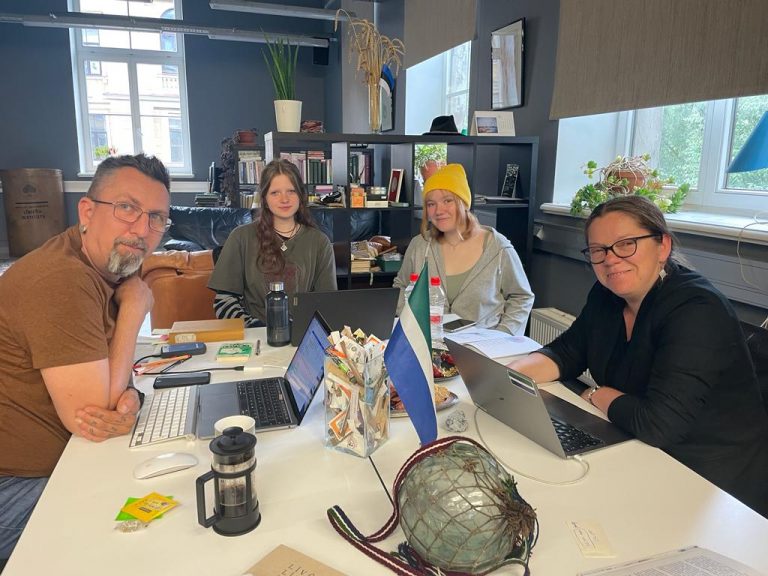
July 25
Hanako (華子 – flower) Namba (難波) of Kyoto University is visiting the Livonian Institute, where she is writing her master’s thesis on Livonian negation forms. She is currently studying earlier sources at the Institute where this subject is discussed and acquainting herself with publications in Livonian.
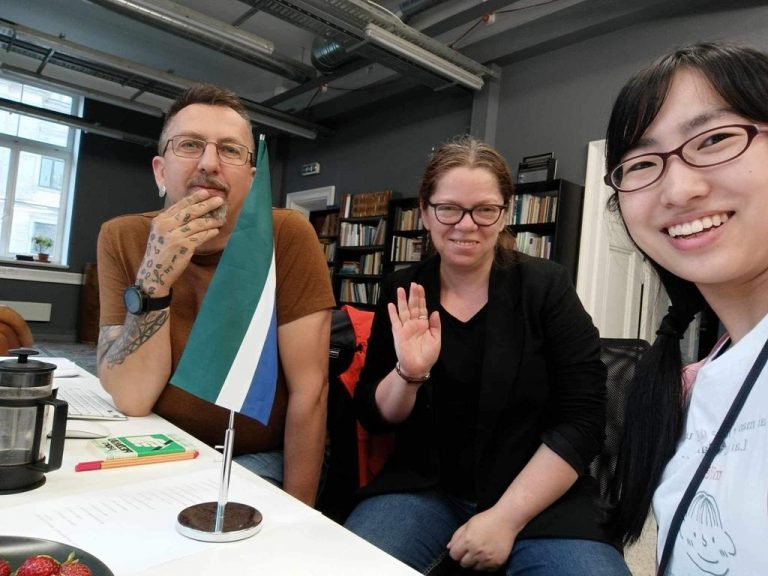
July 24
The 2023 Livonian Yearbook (Līvlizt āigastrōntõz 2023) has been published.
This Livonian Union (Līvõd Īt) publication includes an overview by Livonian Institute guest researchers Ieva Vītola and Lolita Ozoliņa about the Livonian cultural space in the digital space, Lolita Ozoliņa’s review of studies of Vidzeme Livonian family lines, and Ieva Vītola’s conversation with archaeologist Juris Urtāns. This volume also contains Livonian Institute researcher Uldis Balodis’s overview of Livonian community life in the exile community during the Soviet occupation of Latvia.
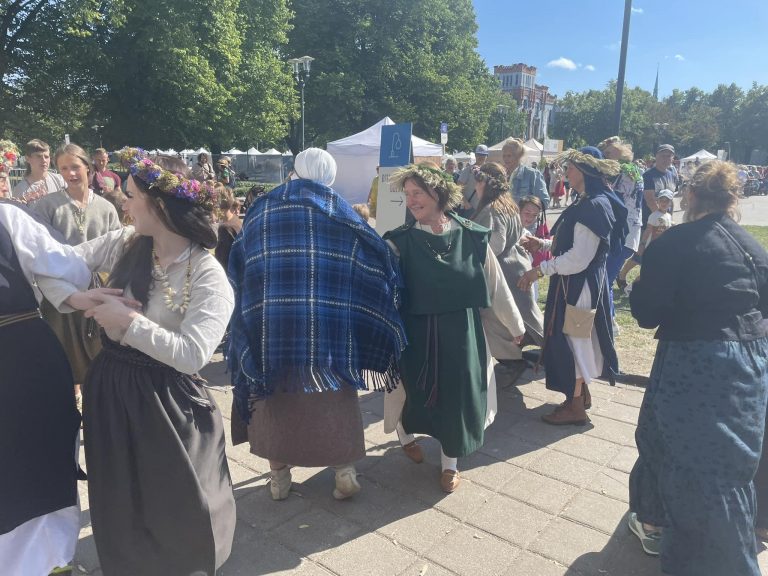
July 22
The Turaida Museum Reserve hosted the discussion “Vēsture un personība: Kaupo ceļojumam uz Romu 820” (History and personality: Kaupo’s journey to Rome at 820).
UL Livonian Institute director V. Ernštreits participated in the discussion. A recording of the discussion is available here.
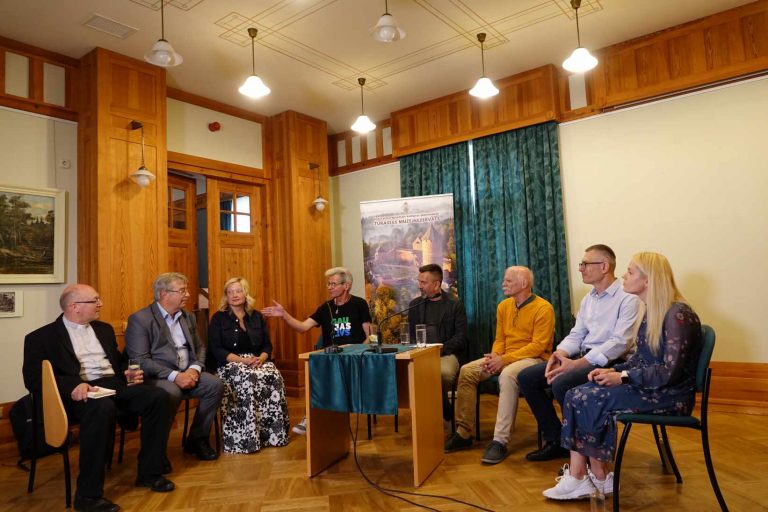
July 18
Brill has published the first volume of the Endangered Languages Yearbook – Teaching and Learning Resources for Endangered Languages (374 pgs.).
The volume was edited by Riitta-Liisa Valijärvi and Lily Kahn. It also includes an article by UL Livonian Institute researchers Valts Ernštreits and Gunta Kļava – “Experiences in Teaching an Endangered Language: Finding the Motivation and Means to Ensure the Acquisition of Livonian”.
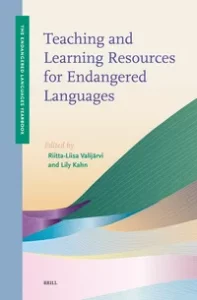
July 9–16
Between July 9th and 16th – in Rīga, Ventspils, Ance as well as in the Livonian Coast villages of Kūolka (Kolka), Irē (Mazirbe), Sīkrõg (Sīkrags), and Pizā (Miķeļtornis) – fieldwork was conducted with the support of the UL Livonian Institute, documenting examples of Livonian and Latvian speech in order to study features of Livonian and Latvian pronunciation and their shared connections. A total of 22 consultants were documented.
The fieldwork was conducted by UL Livonian Institute guest researcher and University of Copenhagen postdoctoral researcher Tuuli Tuisk who studies Livonian and Latvian pronunciation as part of several different projects (Estonian Research Council postdoctoral project PUTJD1107 “Stød in the languages around the Baltic Sea”, Estonian Ministry of Education and Research Kindred Peoples’ Programme project “Livonian pronunciation features”, and the State Research Programme project “A Multifunctional dictionary of Livonian” VPP-LETONIKA-2021/2-0002) and the Southernmost Finnic Prosody Project.
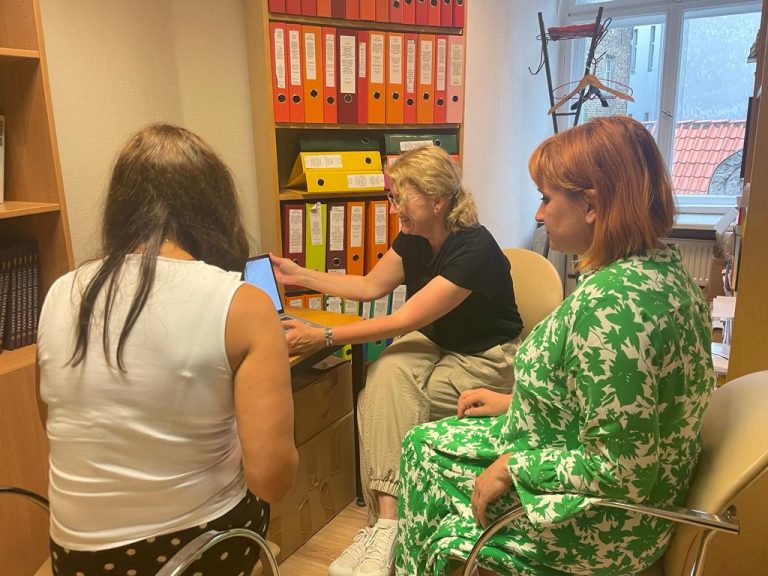
July 13
The Estonian Mother Tongue Society (Emakeele Selts) yearbook has been published in Estonia.
The yearbook includes articles about various aspects of Estonian and its kindred languages including UL Livonian Institute senior researcher Valts Ernštreits’s article about the development of the Livonian placename database. The articles in the yearbook are freely available here.
July 8
Livonian Day in the Song and Dance Festival quarter on the Esplanade, at the Latvian historical lands’ tent. All day long – an opportunity to learn about Livonian heritage, traditions, songs, history, places, and things.
The UL Livonian Institute, the Kūolka Livonian Meeting House, the Ventspils Livonian Association “Rānda”, and the Vidzeme Livonian Heritage Space as well as the Archives of Latvian Folklore and others will be at the tent all day long. UNESCO Assistant Director-General of Culture Ernesto Ottone and Latvian National Commission for UNESCO Secretary-General Baiba Moļņika will also be visiting on Livonian Day. “Livonian Hour” will be taking place from 14:00–15:00 at Vērmane Garden. The Rīga Livonian ensemble “Līvlist” (Rīga), Laula (Kūolka), Cielava (Salacgrīva), Kāndla (Tārgale), Skandinieki (Rīga) will be performing.
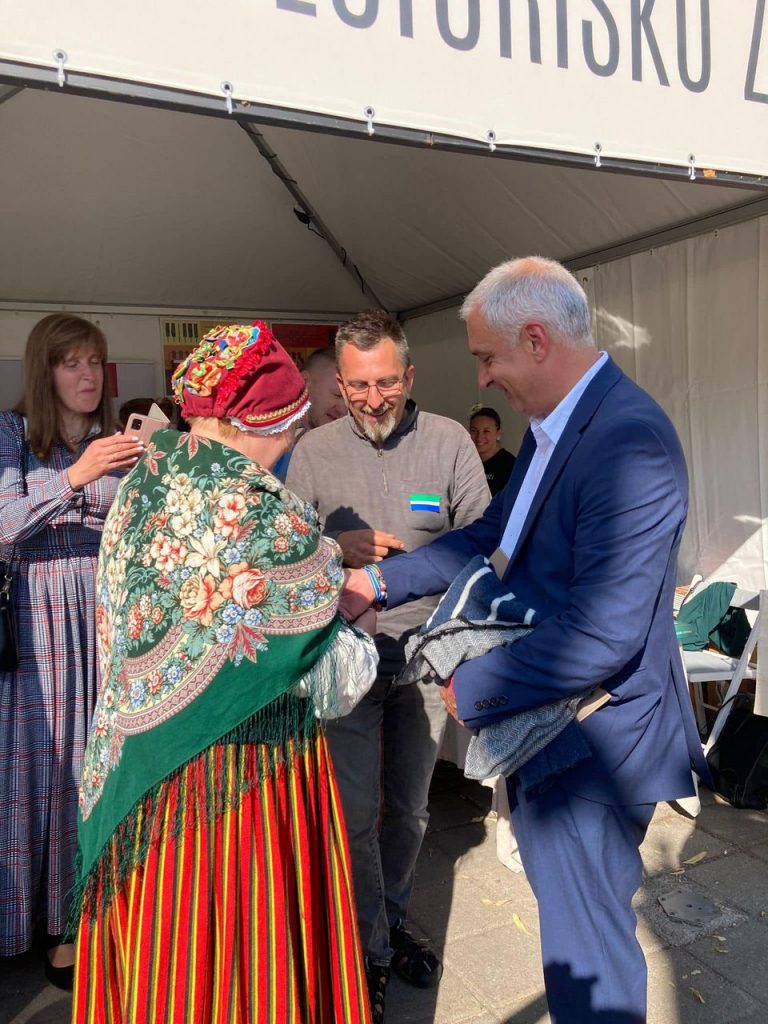
July 4–5
UL Livonian Institute director V. Ernštreits led activities at the Leeuwarden Summer School “Heritage, Identity and Inclusivity” organised by the University of Groningen.
A Livonian poetry night and Livonian heritage master classes also took place during the summer school.
June 27–29
UL Livonian Institute researcher Valts Ernštreits and Sven-Erik Soosaar (Institute of the Estonian Language) participated in the 8th eLex conference held this year between June 27th and 29th in Brno, Czech Republic.
The researchers’ gave the presentation “Ensuring vocabulary consistency for an under-resourced language with limited data” at the conference. The eLex conference has taken place since 2009. Lexicographers from around the world gather there every two years and discuss shared challenges and possible solution in modern lexicography. The goal of the conference is to promote the development of electronic lexicography.
More on the conference here.
June 27
V. Ernštreits spoke about Livonian in the context of the International Decade of Indigenous Languages on the annual J. V. Veski Day organised by the Estonian Mother Tongue Society (Emakeele Selts).
More about the event here.
June 20
Three new books were unveiled on the 60th birthday of Livonian friend, researcher, linguist, University of Tartu professor Karl Pajusalu.
The University of Tartu Press has published a Salaca Livonian language guide in Estonian “Salatsi liivi keele teejuht” (A Guide to Salaca Livonian) authored by Salaca Livonian researchers Prof. Eberhard Winkler and Prof. Karl Pajusalu.
University of Tartu Livonian language teachers and researchers Miina Norvik and Tuuli Tuisk have prepared a Livonian language course “Līvõ kīel optõbrōntõz. Liivi keele õpik” (A Livonian Textbook) intended for acquainting university students with Livonian.
Salaca Livonian poet Ķempi Kārl’s newest poetry collection “Ēzkyrdiz vīzd” (Ways of Closeness) is an excellent gift not only to the author himself, but also to the Salaca Livonian language and to all of the readers of Ķempi Kārl’s poetry who have been anticipating his new collection. As Prof. K. Pajusalu writes in the collection’s afterword, in describing the magic and multifaceted meanings of forms in Salaca Livonian, “…Līb mā can mean not only land of the Livonians, but also land of the future – both of these meanings often coexist in Salaca Livonian poetry”.
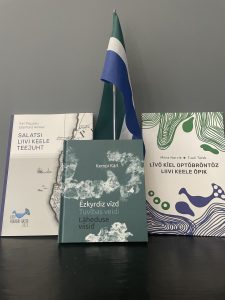
June 13
On June 6th, Livonian cultural activist, folklorist Helmī Stalte passed away.
Parting words for Helmī from the UL Livonian Institute.
Ārmaz Helmī Stalte aim! Armõd sõbrād!
Tämpõ mēg kītõm jumālõks vel īd līvlizõn, kis um jarā lǟnd pids līvõd līndõd riekkõ.
Helmī Stalte vȯļ tǟdõlpandõb ja sūrsugli rištīng. Lețmō tūndõb tǟnda nemē Lețmō virgimizāiga simbolt, folklōr prațțijizt, polītik tējizt. Bet Helmī vȯļ ja um ikš mēšti – līvližist, ikš sūrsugliz ja piškīzõst līvõd rovstõ, mis täm jarā lēmizõks ni līb vel jo piški ja abrāz.
Helmī um vȯnd līvõdõks īdskubs jemīņ äbku pūol āigastsaddõ. Ta vȯļ mädkõks siz, ku sai pūojtõd ansambõl “Līvlist”, ku nõvkub vald võtīz līvlizt kädst jarā õigõm kēratõ eņtš rov paš sizāl, ku sai ūdstõd Līvõd īt, ja ka pierrõ, ku sai ūdstõd Lețmō ja līvlizt saitõ perīzõks kēratõd pandõkst sillõ nemē Lețmō allirov.
Mäd, līvõd, pierāst amā tǟdõl pandõb um vȯnd Helmī tīe, prațțõs ja nägțõs līvõd pierāndõkst, loulõs iļ līvõd ja līvõ kīelkõks, nīžõs ja rõkāndõs iļ līvõd. Helmī Stalte vȯļ se, kis Lețmō virgimizāigal, līvõd plagā nustõs ja līvõ kīels loulõs, nägțiz, ku ka līvõd ātõ ikš jag Lețmōst. Ja līvõd pierāndõkst prațțõs – laz kil loul agā rõkūd abkõks – ta nägțiz amā mōilman, ku līvõd āt viššõd ja lõpsnād, tergiļd ja ukāzt.
Helmī vȯļ jag viššõst līvõd aimstõ. Ta vȯļ līvõd sūrmīe Oskar Stalte tidār, Dainis nai, Julgī, Dāvis ja Raigo jemā. Helmī kazīz ilzõ neku līvli, ja ta um kazātõn līvliži – täm eņtš lapst ja lapstlapst – , kis kāndabõd täm ja ka līvõd pierāndõkst jeddõpēḑõn.
Helmī Stalte – sūrsugli rištīng piškīzõst līvõ rovst, līvõd ja Lețmō istōrij jag – um ni jarā lǟnd pids līvõd līndõd riekkõ. Laz līvõd līndõd kāndagõd Sīnda, Helmī, eņtš kievāmõd tībõd pǟl. Mēg tīedam, ku sōm kubbõ tegīž – nemē alz, kievād, līndõd virgimiz āigal!
Dear family of Helmī Stalte! Dear friends!
Today we bid farewell to another Livonian who has passed on along the Livonian Bird Way. Helmī Stalte was an outstanding and noble person. Latvia knows her as a symbol of Latvia’s national awakening, a cultivator of folklore, a political activist. But Helmī was and is one of us – a Livonian, a member of the noble and small Livonian nation, which with her passing will be even smaller and more fragile. Helmī has been with the Livonians for more than half a century. She was with us when the ensemble “Līvlist” was founded, when the Soviet regime denied the Livonians the right to write their ethnicity in their passports, when the Livonian Union (Līvõd Īt) was reestablished, and also later when Latvia’s independence was reestablished and the Livonians were recognised in the law as Latvia’s indigenous people.
For us, the Livonians, Helmī’s work was most significant of all, cultivating and sharing Livonian traditions, singing about the Livonians and in the Livonian language, talking and speaking about the Livonians. Helmī Stalte was the one during Latvia’s national awakening who raised the Livonian flag and sang in the Livonian language, who showed that the Livonians are also a part of Latvia. And cultivating Livonian traditions – with the help of song and speech – she showed the whole world that the Livonians are strong and kind, impatient and proud.
Helmī was a part of a strong Livonian family. She was the daughter of the great Livonian man Oskar Stalte, the wife of Dainis, the mother of Julgī, Dāvis, and Raigo. Helmī grew up as a Livonian and she raised Livonians – her children and grandchildren, who pass her on and also pass on Livonian traditions.
Helmī Stalte – a noble person from the small Livonian nation, a part of the history of the Livonians and Latvia – has now passed on along the Livonian Bird Way. May Livonian birds carry you, Helmī, on their gentle wings. We know that we will be together again – as ever, in the spring, during the bird waking time!
Translated from Livonian by Uldis Balodis.
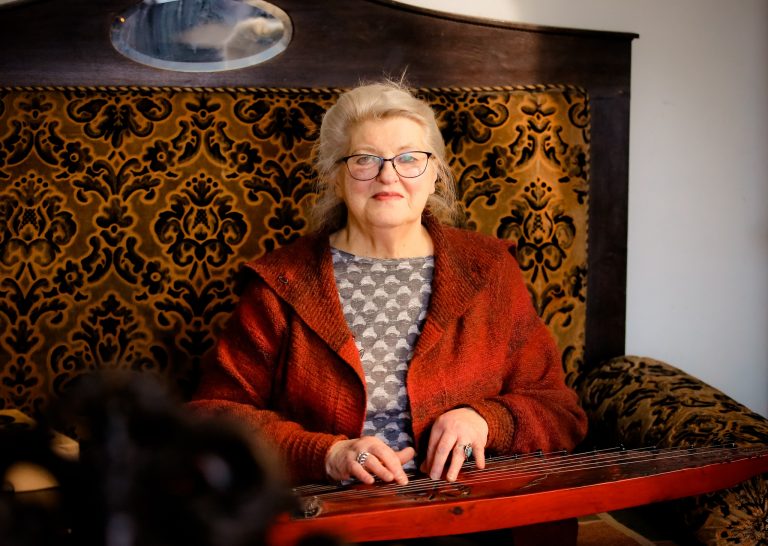
June 9
The conversation “Neredzamā pamattauta – lībieši” (The invisible indigenous nation – the Livonians) at the Conversation Festival “Lampa” in Cēsis was organised by the UL Livonian Institute.
A recording of the conversation is available here.
June 8
The book “Lībiešu [kultūr]telpa” (Livonian [culture]space) is unveiled at the UL Great Hall.
Z. Ernštreite (author) and A. Zeltiņa (photographer) assembled in this book a collection of interviews and photographs of people from the Livonian cultural space. The book was published with the support of the Ventspils Livonian Association “Rānda” and the UL Livonian Institute Support Association.
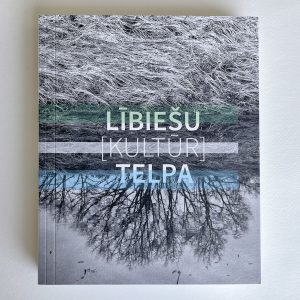
June 5
The Aizkraukle municipality Culture administration is implementing the project “Daugava Livonian traces in Aizkraukle” supported by the programme “The Vidzeme historical land’s cultural programmes 2023”, which is announced and administered by the Vidzeme planning region.
A working group has been established for the project to identify and map existing Livonian cultural material. This group consists of scientists from Latvia representing relevant fields including history, culture, linguistics, and ethnology, and who will work with specialists in tourism and cultural fields from the municipality as well as representatives of NGOs. Seminars will be organised about Daugava Livonian cultural historical heritage and its preservation. Facts will be mapped in order to establish a basis for an emerging cultural tourism programme. The project’s scientific team consists of:
- Valts Ernštreits – University of Latvia Livonian Institute senior researcher and director;
- Eduards Plankājs – University of Latvia Institute of Latvian History historian;
- Juris Tālivaldis Urtāns – Latvian Academy of Culture Institute of Culture and Art senior researcher, National Cultural Heritage Administration Archaeology and History Department expert;
- Ieva Vītola – Latvian Academy of Culture Institute of Culture and Art researcher; University of Latvia Livonian Institute guest researcher;
- Lolita Ozoliņa – Latvian Academy of Culture Institute of Culture and Art researcher;
- Renāte Siliņa-Piņķe – University of Latvia Latvian Language Institute senior researcher, cultural historical landscape researcher;
- Sanita Kalna – National History Museum of Latvia Ethnography Department director;
- Gunta Kļava – University of Latvia Livonian Institute researcher, linguist.
There are plans to continue the project, creating a new cultural tourism route “Daugava Livonian traces in Aizkraukle” during the next project phase.
May 23
A story about awakening Livonian heritage in the newest issue of the journal “Keel ja kirjandus” (Language and literature).
V. Ernštreits’s article is also available online.
May 22
Among many diverse cultural events and projects nominated for the spring ballot (May 22nd to June 2nd) of the Latvian Public Media culture prize “Kilograms kultūras 2023” (A Kilogram of Culture 2023), a jury composed of professionals from public media working in cultural fields has also nominated the community initiative “Livonian Heritage Day on March 26th” in the “Event” category.
May 19
UL Livonian Institute researcher Milda Kurpniece participated in the 38th International Finno-Ugric Student Conference “IFUSCO XXXVIII”, which has now concluded.
This interdisciplinary conference brings together students, future and experienced researchers who study Finno-Ugric peoples and languages in fields such as linguistics, ethnography, history, literature, translation theory, and many others. Since 1984, IFUSCO has been held at a different university every year; this year – at the University of Turku and Finland. Our researcher Milda Kurpniece spoke about widespread narratives on the Livonian Coast.
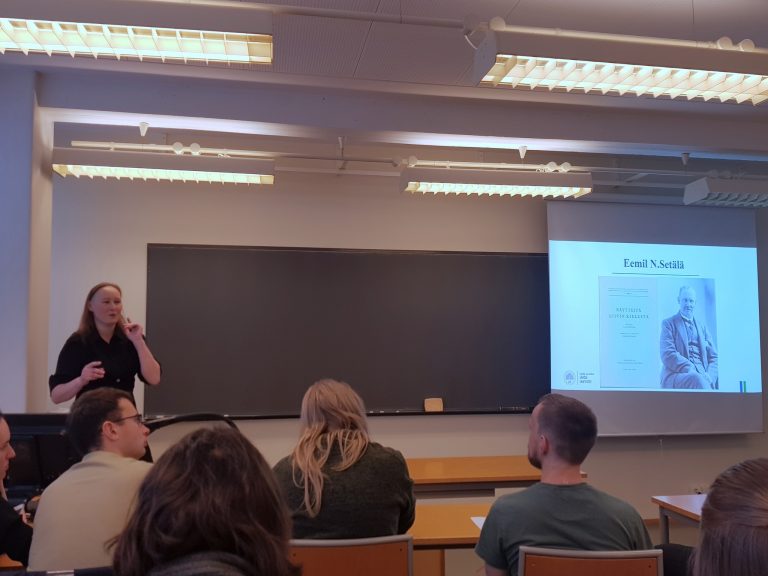
May 19
V. Ernštreits participated in the Estonian Culture House’s conference with his presentation on cultural spaces in Latvia.
At the conference “Muutunud kogukondlikud kultuurimaastikud” (Changing community cultural landscapes), which is Estonia’s largest cultural forum, V. Ernštreits spoke and participated in discussions about the Livonian community, the sustainability of Latvia’s cultural spaces, and the recently adopted Latvian historical lands law.
May 18
A conversation with Ventspils Livonian Days’ organiser, Ventspils Livonian Association “Rānda” board member, and UL Livonian Institute project assistant Māra Vīgerte appears in the newspaper “Ventas Balss”.
The interview is available here.
May 18
An illustrated issue of the magazine “Pasaules Vēsture” (World History) has been published with a spread featuring the Livonian written language.
The article was prepared at the UL Livonian Institute in response to a question from a reader: “Does Livonian have a written language?”
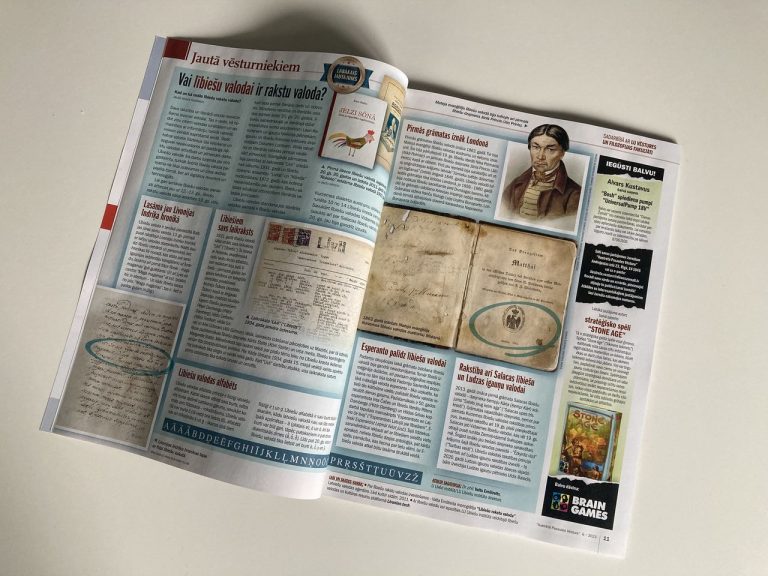
May 17
The UL Livonian Institute participates in an activity for students at Ventspils State High School No. 1.
We discussed the Livonians as well as possibilities for doing scientific research on the Livonians and Livonian heritage with students from the senior classes. We are always delighted by the interest of schools in educating their students about Livonian heritage, but especially that this interest is ever more noticeable in Ventspils where more than just a few students with Livonian ancestry are studying.
May 12
Vilnius University students visit the UL Livonian Institute.
Thanks to the students – Latvian language learners – and their teachers Ernesta, Agne, and Vytautas who wanted to introduce their students to Livonian language and culture, knowledge of which is useful for any future Balticist.
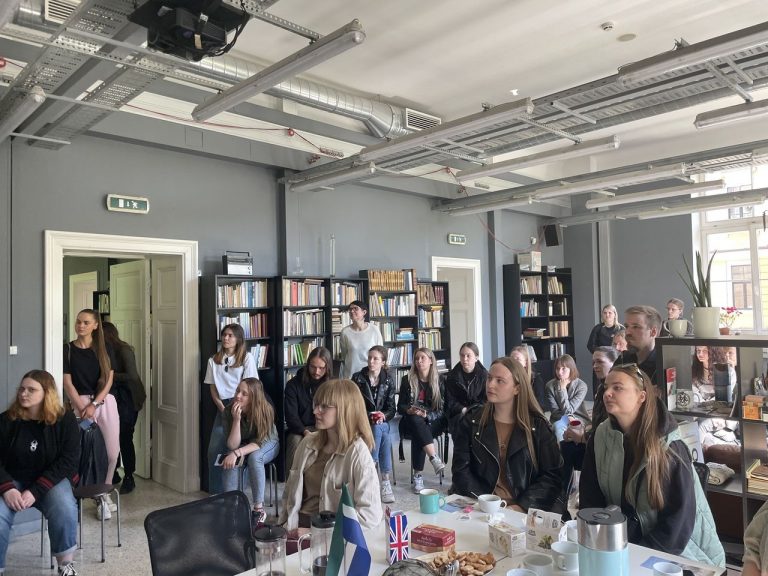
May 11
University of Tartu Livonian language students visit the UL Livonian Institute with their teacher Miina Norvik and her colleagues.
It is always a joy to receive good friends and truly interested future researchers!
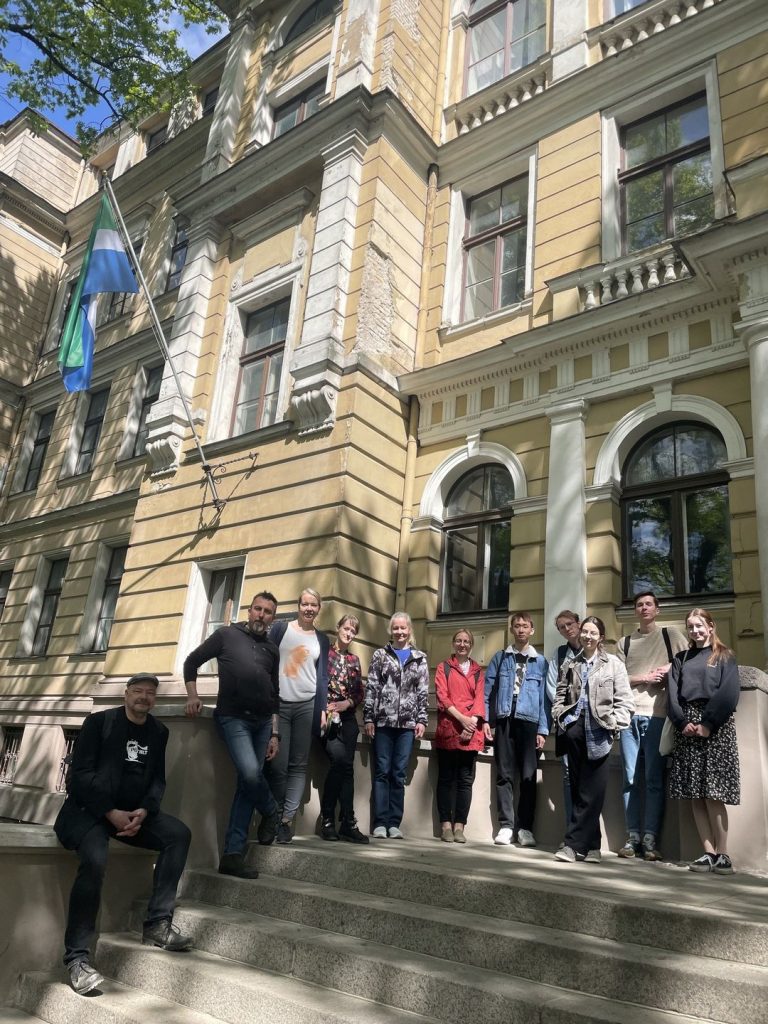
May 9
A new doctoral dissertation on Livonian has been defended at the University of Tartu.
Our most heartfelt congratulations to Marili Tomingas and we hope for great future accomplishments in the broad field of Livonian research!
May 6
The portal lsm.lv on the Institute’s Livonian language learning materials for beginners.
The authors of the “Op līvõ kīeldõ!” learning materials are UL Livonian institute researchers Gunta Kļava – who worked out the linguodidactic principles for Livonian language acquisition as part of her postdoctoral project (PostDoc No. 1.1.1.2/VIAA/3/19/527) on adjusting the standard levels used for quantifying language proficiency for endangered languages – and Valts Ernštreits. The video lessons were created in cooperation with the team from the Tavaklase.lv platform of the Republic of Latvia National Centre for Education.
The article is available here.
May 4
The seminar “Documentation for Education of Lesser Used Languages” took place in Rēzekne as part of the project “Minority Languages, Major Opportunities. Collaborative Research, Community Engagement and Innovative Educational Tools (COLING)”.
UL Livonian Institute researcher Uldis Balodis spoke about the history of Livonian and Lutsi orthography and education at this international seminar organised by the Latgalian culture movement “Volūda”.
May 1–5
The 3rd session of the UN Group of Experts on Geographical Names takes places at UN headquarters in New York.
Latvia is represented in the group by the Latvian Geospatial Information Agency. Latvia’s report also includes information about the work done by the UL Livonian Institute in identifying and promoting the use of Livonian placenames.
April 25
The new Livonian language course for beginners “Op līvõ kīeldõ!” was unveiled during the visit of Estonian president Alar Karis to the UL Livonian Institute.
The course was prepared by the UL Livonian Institute in cooperation with Livonian young people – functioning in the role of both teachers and students – and the team associated with the instructional platform Tavaklase.lv – developed by the Republic of Latvia National Centre for Education – which filmed the videos.
In the first phase of the design of this course, 10 lessons were prepared, which will allow a committed student to describe themselves, ask their conversation partner to describe themselves, and to give some basic information about other people. Every video lesson includes printable worksheets for learning and memorising its content, which also helps practice writing Livonian.
This course is available at the UL Livonian Institute’s Livonian language and culture resource platform livonian.tech in the “Teaching aids” section and on the instructional platform Tavaklase.lv.
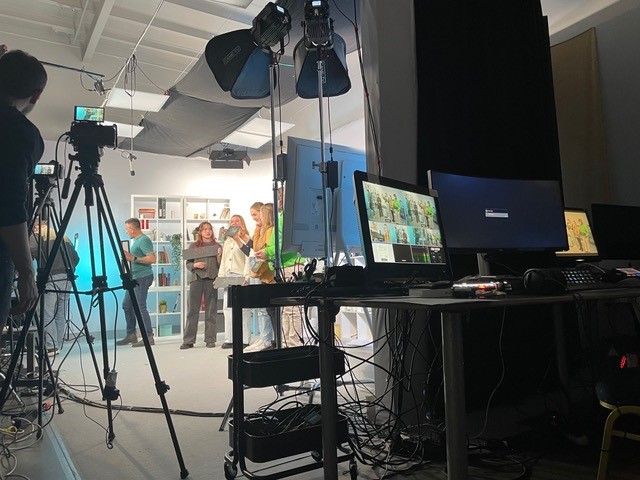
April 25
Estonian president Alar Karis visits the UL Livonian institute and unveils the new Livonian language course for beginners.
The beginning video Livonian language course “Op līvõ kīeldõ!” (Learn Livonian!) – intended for everyone interested in taking their first steps in learning Livonian – was unveiled at the University of Latvia Livonian Institute during the state visit of Estonian president Alar Karis.
The Livonian young people who participated in preparing these video language learning materials also taught the Estonian president a few useful Livonian phrases during the event, while the president emphasised that the future of the Livonian language is closely linked to popular interest. If so, then there will be progress as well as results for the Livonians.
These language learning materials are available at the UL Livonian Institute’s Livonian language and culture resource platform livonian.tech in the “Teaching aids” section and on the instructional platform Tavaklase.lv.
Many thanks to the Livonian children, the Tavaklase.lv team, and to Julgī Stalte!
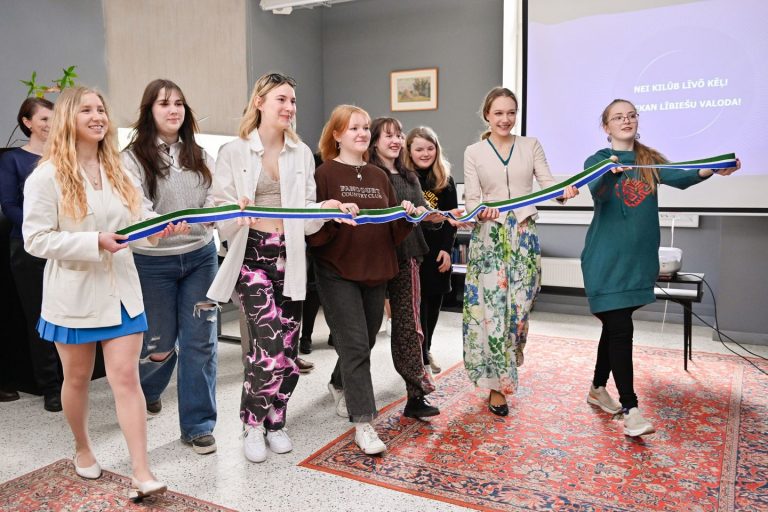
April 21
On April 21st, a discussion took place at the Latvian embassy in Finland about the status of Latvia’s indigenous people – the Livonians – and European indigenous languages in the context of present-day geopolitics and cultural politics as well as about the role and responsibility of the Global Working Group of the UN International Decade of Indigenous Languages.
Livonian academics and poets participated in the discussion: Valts Ernštreits (University of Latvia Livonian Institute, Director) and Ķempi Kārl (Karl Pajusalu, University of Tartu Institute of Estonian and General Linguistics, Professor of History and Dialects of the Estonian Language). These experts spoke about the Livonian language and culture situation as well as about what are the contributions and responsibilities of Latvian expertise in the Global Working Group of the UN International Decade of Indigenous Languages – and also what is the UN’s responsibility in these questions.
Latvia has been actively involved in matters relating to indigenous peoples by becoming a member of the Global Working Group of the UN International Decade of Indigenous Languages and also by taking on the responsibility of being the co-chair of the working group from 2022 to 2023 (Latvia is represented in the working group by UL Livonian Institute director V. Ernštreits).
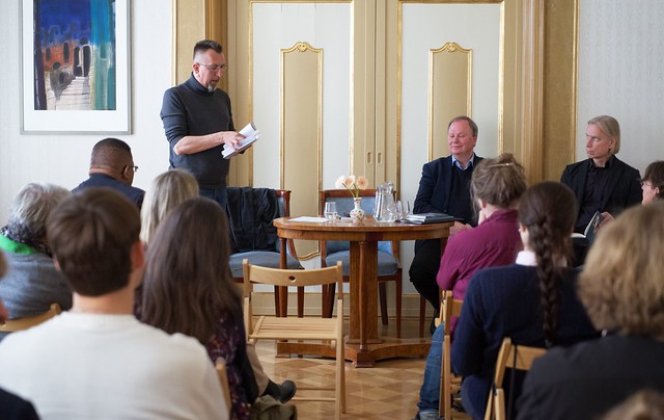
April 10–21
The UL Livonian Institute’s course on Livonian language and culture is taking place from April 10th to 21st as part of the Erasmus+ programme project “REMODUS: Digital Transformation and Internationalization in and beyond Uralic Studies”.
The Livonian language and culture course is intended for current and future researchers as well as students from a variety of countries. Its attendees include 31 participants from various European universities.
The project is coordinated by the University of Vienna and is being implemented in cooperation with Eötvös Loránd University (Budapest), the University of Hamburg, the University of Helsinki, Ludwig Maximilian University (Munich), the University of Latvia, the University of Szeged, the University of Tartu, the University of Turku, and Uppsala University.
April 2
The UL Livonian Institute’s congratulations to the Livonian Union (Līvõd Īt) on its 100th anniversary.
Ku 1923. āigast 2. aprīls sai pūojtõd Līvõd Īt, sīe pūojtijizt uskīztõ ja lūotiztõ, ku līvlizt ja Līvõd Īt pīlõbõd ka vīžkimdõ ja sadā āigast pierrõ.
Tämpõ, laz kil mis suggõn, līvõd āt īdõkabāl täsā. Ja näntkõks īdskubs īdõkabāl um ka Līvõd Īt. Irēl Līvõd rovkuodā jūs suggõbõd sīe tīedõd Līvõd pivād, ja sõvskūols sōbõd īdõkubbõ līvõd lapst. Tämpõ, ku īt pivāstõb eņtš sadā āigast jubilej, võib kītõ, ku sīe pūojtijizt lūotõkst āt täutõnd.
Um seļļi pū – tam. Ukāz ja knaš pū, mis lețliztõn tǟtõb tõvvidi jūŗi ja joudõ.
Eņtš pū um ka līvliztõn. Se äb ūo sūrsugli pū. Bet se kāndab eņtš sizāl līvõd viššõmt. Sīe oksād ātõ kaitsõnd ja ka tämpõ kaitsõbõd līvõd kuodīdi kuŗē jedst. Sīe mōŗad sigžõl ātõ punnizt neku alz ȭgiji lūotõks ja rōz karrõd nemē amā līvõd jelāmi.
Se um pū, mis nei väggõ um līvõd īlma jagūks, ku sīe nim ka lețlizt ātõ līvõ kīelst täpīņtõnd. Pīlgõz – Pīlādzis.
Nīžõbõd, ku pīlgõz, mis immõr killiji līvõ kēļ, lōlõd ja nagrimi, kievād pīerpǟva ūoņdžõl – kūoḑõn līndõd virgtimiz āigal – lītiz irg ēdrikšõb aļļõ-vālda–siņņizt ēdrõmõdõks, laz ka līndõd ja līvõd tīedagõd, kus tāgiž tūlda. Laz se mäd andtõd līvõd pū kaitsõg Līvõd Ītõ tulbižis sugkazāmis.
Pǟgiņ vȯnnõ, Līvõd Īt!
When the Livonian Union (Līvõd Īt) was founded on April 2, 1923, its founders believed and hoped that the Livonians and the Livonian Union would still exist in fifty or a hundred years.
Today, despite what has happened, the Livonians are still here. And together with them is also the Livonian Union. The Livonian Festival is held in Irē (Mazirbe) next to the Livonian Community House and Livonian children come together at the summer school. Today, as the Union celebrates its 100th anniversary, one could say that the hopes of its founders have been fulfilled.
There is a tree – the oak. A proud and beautiful tree, which for the Latvians represents deep roots and strength.
The Livonians also have their own tree. It isn’t a grand tree. But it holds within itself the Livonians’ endurance. Its branches are protected and also today it protects Livonian houses against evil. In autumn, its berries are red like burning hope and a little bitter like all Livonian life.
It is a tree that is such a powerful part of the Livonian world that even its name was borrowed by the Latvians from the Livonian language. Pīlgõz – Pīlādzis – Rowan.
They say that the rowan, as is often heard in Livonian, in songs and jokes, on the morning of the Spring Equinox – and especially during the bird waking time – for a brief instant blooms with green-white-blue flowers, so that the birds and the Livonians know where to return. May this Livonian tree of ours protect the Livonian Union in its future growth.
Many happy returns, Livonian Union!
Translated from Livonian by Uldis Balodis.
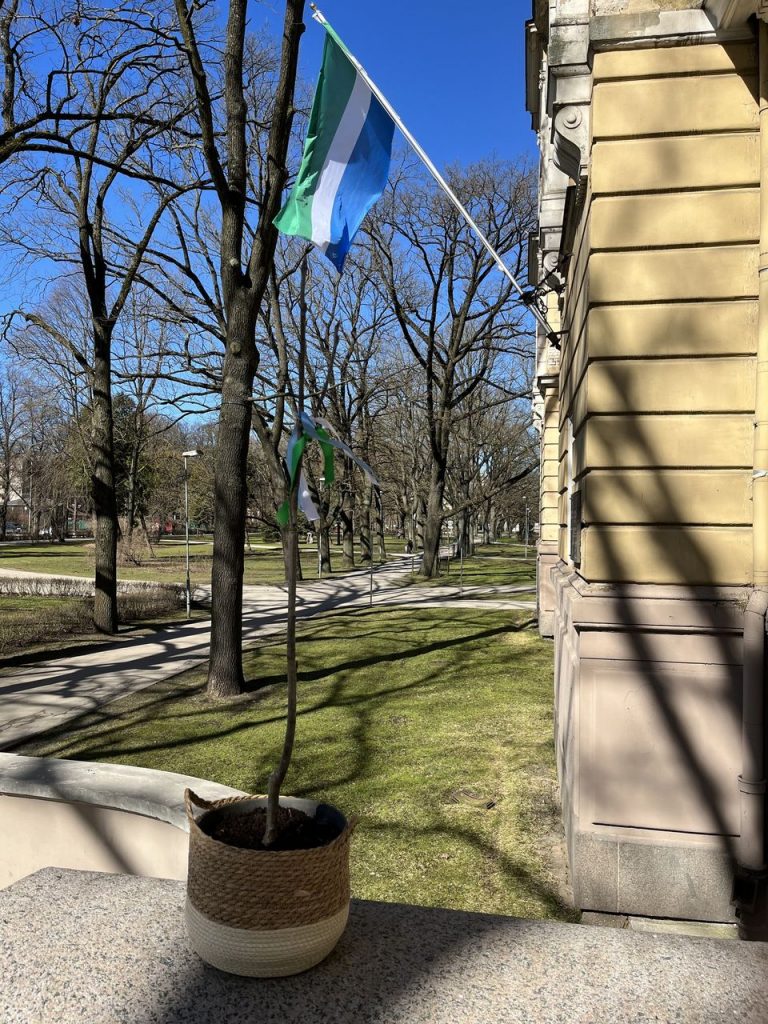
April 1
Institute researchers Valts Ernštreits and Gunta Kļava participated in a seminar organised for young people by the Latvian National Commission for UNESCO focused on becoming acquainted with the use of methodological materials for promoting youth cultural literacy.
Young people met in Jēkabpils with teachers from UNESCO-affiliated schools in Grobiņa, Jaunsilava, Jēkabpils, Kuldīga, Ozolnieki, Pļaviņas, Rīga, Skujene, and Valmiera.
As in methodological materials there is special emphasis on highlighting indigenous culture and language, the Livonian Institute participated in the seminar with a presentation on the language and cultural values of Latvia’s indigenous people – the Livonians. It emphasised that this heritage is present all around, for example, in everyday language, placenames, and that a portion of this cultural heritage is carried by every person living in Latvia.
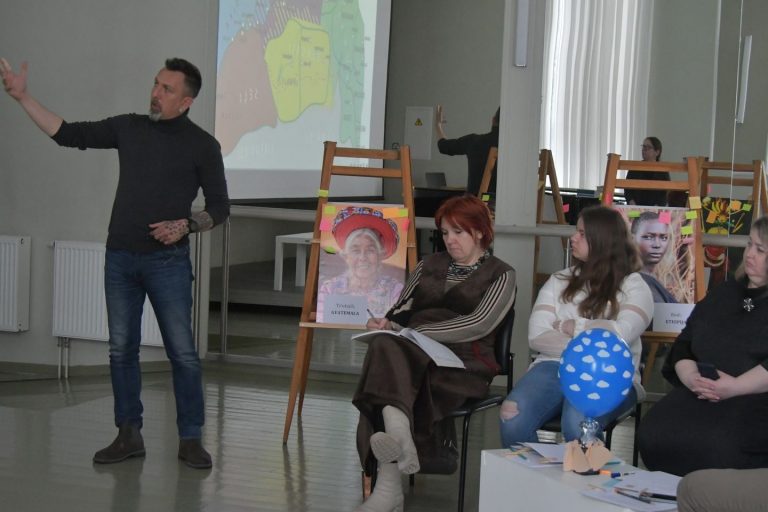
March 26
On the first Sunday after the Spring Equinox, which is on March 26th this year, Livonian Heritage Day is being celebrated for the first time in the territories historically inhabited by the Livonians.
Livonian Heritage Day events – bird waking, raising the Livonian flag, and others – took place at more than a hundred locations in Latvia and Estonia. From Aizkraukle to Pize, from Tārgale to Tallinn, in Vidzeme and Kurzeme the birds were awoken and Livonian flags raised.
More on Livonian Heritage Day celebrations at the UL Livonian Institute Facebook page.
Event locations and a description and video of the bird waking tradition: www.libiesugads.lv
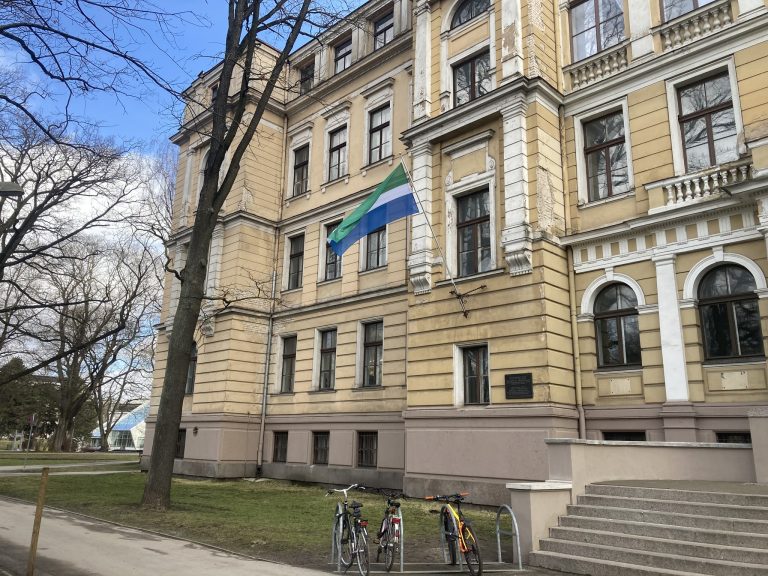
March 24
The Presidium of the Saeima (Latvian parliament) meets UL Livonian institute director Valts Ernštreits.
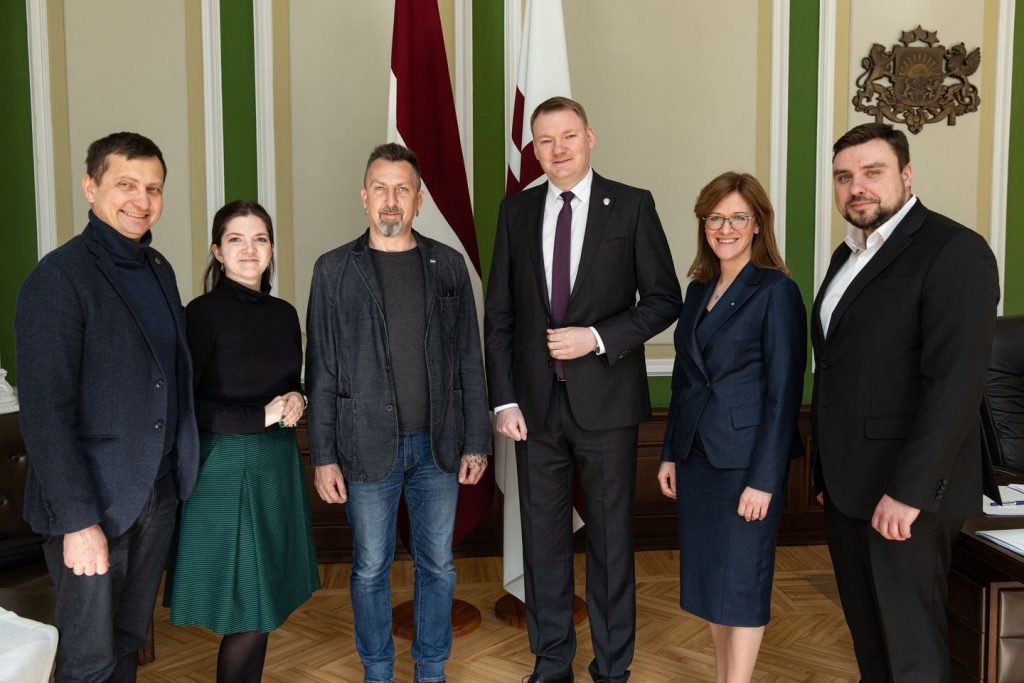
March 23
In anticipation of the arrival of Livonian Heritage Day on March 26th, University of Latvia Livonian Institute director Valts Ernštreits speaks on the Radio Latvia 1 programme “Zināmais nezināmajā” (The known in the unknown) about Latvia’s indigenous people – the Livonians, the relationship between humans and nature, and how this is illuminated by Livonian cultural heritage and manifestations present today.
Listen to the programme recording for more on these topics.
March 21
The Latvian National Commission for UNESCO invites everyone to give others the gift of poetry to celebrate World Poetry Day.
The UL Livonian Institute, as a reminder of the approach of Livonian Heritage Day on March 26th, is giving the gift of the brand-new poem by Salaca Livonian poet Ķempi Kārl on the reasons why the birds must be awoken.
AWAKEN LIVONIAN BIRDS
awaken the green birds
of this land
awaken the blue birds
of the Livonian sea
awaken the white silent birds
of the vast melting shore
today is a feast for birds
today is a day for awakening
awaken Livonian birds
to glide across borders
spring seeks its nest
the soul seeks language a home
receive these Livonian birds
awaken water birds
awaken bog birds
awaken forest birds
awaken sky birds
listen to their voices
listen – Livonian birds are coming
listen as you hear them
lark
lapwing
quail
crane
grouse
swan
stork
sandpiper
wagtail
may white birds awake
may blue birds awake
may green Livonian birds awake
may birds of language
of glimpsing
of grasping awake
awaken this season of light
and see as birds do
awaken the bright path ahead
so borderposts sprout leaves
awaken the birds giving spring its voice
awaken their wings
awaken your own
awaken the birds within yourselves
to see higher
to soar closer to the light
awaken the vastness of Livonian lands
for all birds to find
a place to awake
Translated from Salaca Livonian by Uldis Balodis.
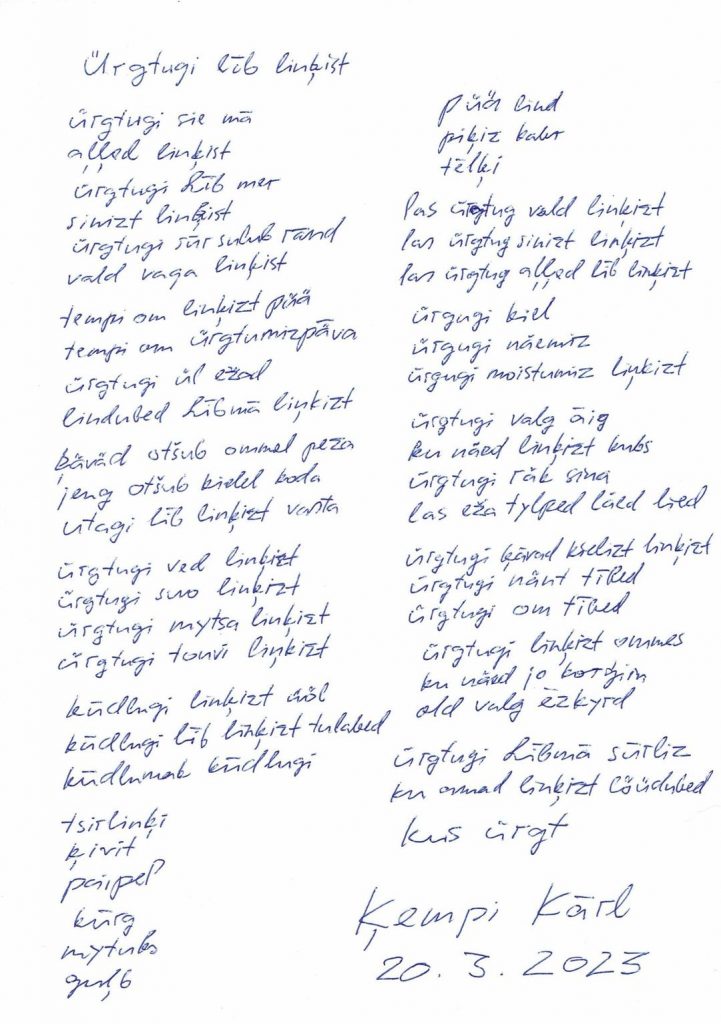
March 17
Vidzeme Livonian Heritage Space leader, Latvian Academy of Culture doctoral student Lolita Ozoliņa and University of Latvia Livonian Institute director Valts Ernštreits were guests on the Radio Latvia 1 programme “Kultūras rondo” (Cultural rondeau).
This year on March 26th, Livonian Heritage Day will be celebrated for the first time in regions historically inhabited by Latvia’s indigenous people – the Livonians – and everyone is invited to join this celebration. The UL Livonian Institute – in cooperation with the Latvian National Commission for UNESCO and the Latvian National Centre for Culture – has declared 2023 to be Livonian Heritage Year. The locations of Livonian Heritage Day events can be found at www.libiesugads.lv as well as a video describing the Livonian bird waking tradition.
March 14
Estonian public media on the work of a University of Tartu Institute of Computer Science researcher with Livonian language data, which may lead to the creation of Livonian machine translation in the future.
The University of Tartu Institute of Computer Science is continuing experiments with Livonian machine translation with the help of the Livonian language data we have collected. The opportunity to access the large amount of intangible heritage written in Livonian will be of considerable benefit to any Livonian researcher or anyone else interested in Livonian heritage.
The article is available here.
March 1
The UL Livonian Institute – in cooperation with the Latvian National Commission for UNESCO and the Latvian National Centre for Culture – has declared 2023 to be Livonian Heritage Year.
Everyone is invited to commemorate Livonian Heritage Day on March 26th by participating in bird waking at Cape Kūolka, in Salaspils, Rīga, Turaida, Pāle, and elsewhere.
On this day, Livonian flags and colours will be visible in many places across Latvia – at various official buildings and at places connected to the Livonians.
A map of Livonian Heritage Day events is available at www.libiesugads.lv as well as a video describing the Livonian bird waking tradition.
February 27–March 3
In cooperation with the University of Tartu Collegium for Transdisciplinary Studies in Archaeology, Genetics and Linguistics, the University of Tartu Centre for South Estonian Language and Culture Studies, and Pärnu College, UL Livonian Institute director V. Ernštreits participated in the Estonian interdisciplinary lecture series “The Languages and Cultures of the Gulf of Rīga”.
Information about the lecture series available here.
February 20
On the eve of International Mother Language Day, a major historical moment for Livonian took place – the first road sign was unveiled on which Livonian appears alongside Latvian. Latvian President Egils Levits, LU Livonian Institute director Valts Ernštreits, Talsi municipal council deputy Aldis Pinkens, and the Kūolka Livonian ensemble “Laula”. Later, the Latvian president met with local residents at the Livonian Community House in Irē (Mazirbe) to speak about preserving and caring for Livonian cultural historical heritage.
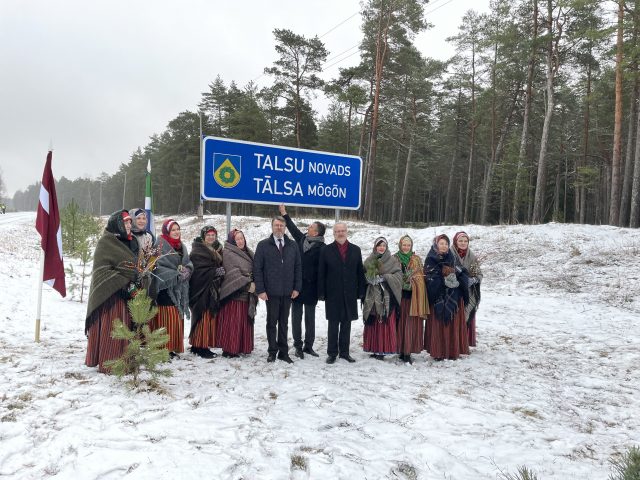
January 26
Talsi municipality has installed the first official road sign in Latvia’s history, on which the Livonian name of Talsi municipality appears alongside its Latvian name. The official unveiling of the new road sign is planned for February; however, the newly installed road sign is already informing drivers of the municipality’s boundaries. A total of eight road signs of this type have been installed in Talsi municipality: replacing four existing signs and installing four new ones.
The initiative for the new bilingual road signs came about as a result of the interinstitutional meeting “Par iespēju uzstādīt ceļazīmes ar informāciju lībiešu valodā” (On the possibility of installing road signs with information in Livonian) of 17 August 2021, which supported the addition of Livonian to road signs and adopting a standard for these new signs. The UL Livonian Institute proposed the idea of installing Livonian-language signage for locations in the Livonian cultural historical territory – the Livonian Coast, which is located within the territory of Talsi municipality. The Institute also performed the necessary preliminary work: assembling information about the road signs within the territory of Talsi municipality which would need to be replaced and installed as well as specifying the precise form of Livonian and Latvian names.
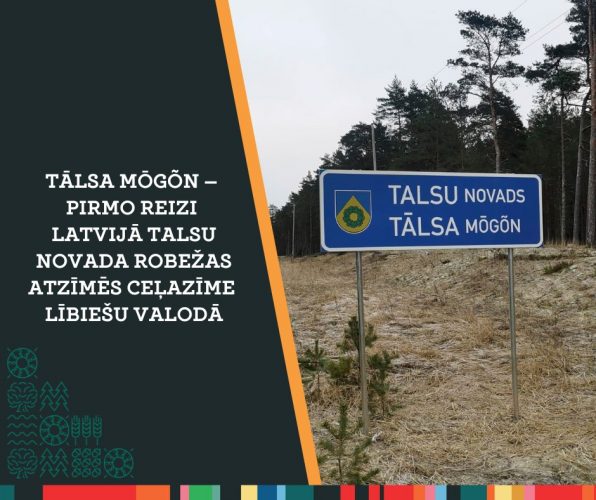
January 25
UL Livonian Institute researcher Uldis Balodis participated in the University of Warsaw Center for Research and Practice in Cultural Continuity seminar series “Decolonizing approaches to studying history and linguistic-cultural heritage. Methods, tools, results and challenges” with his lecture “Lutsi and the Finnic communities of Latvia”. He spoke about Lutsi language, history, and his research as well as about the role of Latvia’s other Finnic communities – especially the Livonians – in the development of Latvian language, culture, and identity.
January 10
The Latvian Association of Archaeologists has selected the national cultural monument “Svētupe Livonian Sacrificial Cave – a ritual place” (No. 1476) as the Archaeological Monument of 2023; in 2001, it was included in the list of geological and geomorphological protected natural monuments.
2023 is special, because exactly 50 years ago an archaeological study of the Svētupe sacrificial cave was conducted under the supervision of archaeologist Juris Urtāns (1973), but also because this is the Livonian Heritage Year, the goal of which is to make Latvia’s Livonian roots visible and palpable. The selection of the Svētupe Livonian sacrificial cave as the archaeological monument of the year is an excellent reason to get to know this unique monument – either for the first time or again – and also draw attention to other archaeological monuments connected to the Livonians in Latvia!
In terms of preserving Livonian cultural heritage, it is important to note that in Latvia, sacrificial caves have thus far only been identified in Livonian-inhabited territories – along the shores of the Svētupe, Salaca, Gauja, and Īģe Rivers – and are a unique testament to the ancient sacredness of the Livonian cultural space.
January 8
UL Livonian Institute director Valts Ernštreits and singer, composer Elīna Ose play a Livonian game, which reveals various interesting facts about the Livonians. Watch a recording of the game here.
Modern-day popularisers of Livonian culture – UL Livonian Institute director Valts Ernštreits and singer, composer Elīna Ose – visit the Latvian television programme “Kultūrdeva” (A dose of culture). Their conversation is about Livonian culture and the recently opened Livonian Heritage Year. A recording of the programme is available here.
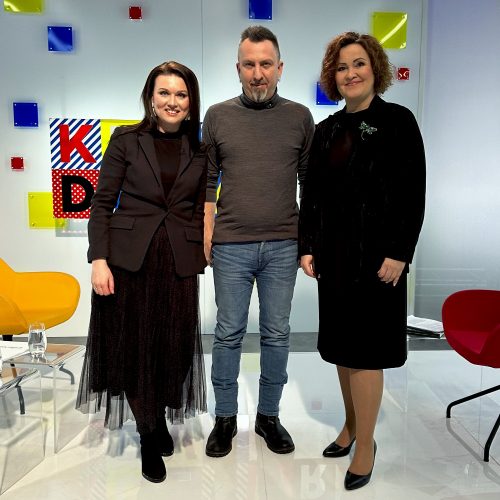
January 2
UL Livonian Institute director Valts Ernštreits and guest researcher Lolita Ozoliņa speak on the Radio Latvia 1 programme “Kultūras rondo” (Cultural rondeau) about Livonian Heritage Year and the situation of Latvia’s indigenous languages, the preservation of which is at the focus of the language decade announced by the UN. A recording of the programme “Mazās valodas pasaulē un lībiešu kultūras mantojuma saglabāšana” (Small languages in the world and the preservation of Livonian cultural heritage) is available here.
19. oktobris
Radu tautu dienu ietvaros Tallinā, Igaunijā, norisinās radu tautu tematikai veltīta konference.
Šoreiz, pieskaņojoties Lībiešu mantojuma gadam, konference veltīta Latvijā dzīvojošo Baltijas jūras somu tematikai – līdztekus lībiešiem konferences referātos tiks apskatīti savulaik Lejasciema un Gaujienas apkaimē mitušie leivi, Ludzas igauņu un Latvijas votu atzars – Bauskas apkaimē mitušie krieviņi. Īpašs prieks, ka konferenci ar dziesmām kuplināja lībiešu bērni un jaunieši no lībiešu bērnu un jauniešu vasaras skolas “Mierlinkizt”, simboliski parādot lībiskās identitātes turpināšanos un nākotnē vērsto skatu.



